
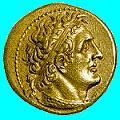

















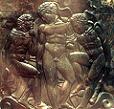
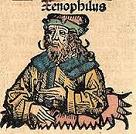
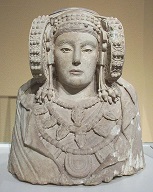
-400 World pop.: 162M. The 95th Olympiad; Hippias of Elis (-460 to -399) compiles a list of Olympic victors back to the 1st Olympiad. Roman consuls: Publius Licinius Calvus Esquilinus and Publius Manlius Vulso and Lucius Titinius Pansa Saccus and Publius Maelius Capitolinus and Spurius Furius Medullinus and Lucius Publilius Philo Vulscus - you can't have too many Roman consuls? Dionysius I of Syracuse conquers Leontini, and extends his control over the Sicels. Conon and Iphicrates are elected rulers (archons) of Athens. Persian satrap Tissaphernes sieges Cyme, causing Sparta to send Thibron with a mercenary army to liberate the Ionians from Persia. About this time the Celtic (Alerci) Cenomani tribe of Gaul (modern-day Maine) under Elitovius crosses into the Po River Valley of Italy and drives out the Etruscans, founding a town on the later site of Cremona (ends -218), going on to part ways with other Celtic tribes in being friendly with the Romans; meanwhile the Celtic Boii tribe from Bohemia crosses the Great St. Bernard Pass and conquers the Etruscan town of Felsina, renaming it Bononia (modern-day Bologna, pop. 389K/1M), going on to intermarry with the Etruscans but stay Celtic. About this time the Celtic kingdom of Noricum is founded in modern-day Austria and Slovenia, bordered on the N by the Danube River, on the W by Raetia and Vindelicia, on the E and SE by Pannonia, and on the S by Italy, with capital at Virunum at the foot of Mt. Magdalensberg, becoming the S outpost of the Celts and launching point for attacks on Italy, becoming known for cattle breeding rather than agriculture because of their poor soil, and for supplying iron for Noric Steel, as well as Celtic nard (saliunca) for perfume. About this time measles enters the human pop. that lives in big cities? As the cent. begins Sparta basks in its power, although a Delphic oracle warns of coming disaster? In this cent. Jews begin migrating to Rome and various Mediterranean towns, forming separate communities; by the next cent. large numbers live in Greece, esp. Rhodes and Thessaloniki (Salonica) (founded in -315 by Cassander of Macedon) (modern-day pop. 325K/1M) which becomes known as "the Mother of Israel". In this cent. the Celts arrive in County Limerick, Ireland, splitting it into petty kingdoms (tuatha). About this time Celts settle in Poland via the area of Morawy, settling in Lower Silesia S of modern-day Wroclaw; more groups settle near modern-day Cracow and Lesser Poland. About this time the Garamantian Kingdom in Fezzan (C Libya W of Cyrenaica and S of Tripolitania) is founded by the Berbers (Amazigh), going on to build an underground network to gather fossil water from underneath the limestone layer, and harass Roman coastal settlements until Roman Emperor Septimius Severus captures their capital city of Garama in 202 C.E.; they become kaput by 600 C.E. In this cent. the town of Mamshit is founded by the Nabateans in the Negev. By the beginning of this cent. Oscan-speaking peoples move into Campania (S of Latium on the Tyrrhenian Sea coast), Lucania (Basilicata) (from the Tyrrhenian Sea to the Gulf of Taranto), and Bruttium (Calabria) (toe region across the Strait of Messina from Sicily), all in Magna Graecia. The beginnings of Scarlett O'Hara in the Emerald Isle? In this cent. the Picts push into Antrim and Down, Ireland, and the Belgics (Belgii) and Brythons (Britons) migrate into SE Ireland, the latter founding the Kingdom of Tara. In this cent. the kingdom of Meroe in Egypt has three kings who leave inscriptions while battling the nomadic Blemmyes: Ammannoteyerike (Ammannoteyeriké), Harsiotef (-404 to -369), and Nastasen (-335 to -310). The Hopewell Civilization (ends 500 C.E.) is founded in the Scioto Valley of SC Ohio, driving a wedge into Adena territory and causing the latter to begin to decline. In the first half of this cent. Chalcidice-born Greek philosopher Xenophilus (-300s) flourishes, becoming the last of the Pythagoreans, and the only one to live in Athens in the 4th cent. B.C.E.; a fter Pliny claims that he lives to age 105 without ever getting sick, he becomes a celeb in the Renaissance. In this cent. the Phoenicians settle the southernmost spot on the Mediterranean coast of France, which the Greeks later resettle under the name Olbia, and the Massiliotes (occupants of Marseille) fortify against the Salyes and Ligures tribes living in the Alps; by 964 C.E. it is called Hyeres (Hyères). A cemetery dating from this cent. is found in the Ligurian city of Genua ("knee") (modern-day Genoa) on the Riviera 80 mi. S of Milan, proving Greek occupation of its fine harbor. In this cent. Rome begins minting bronze money to facilitate payments to the govt. Liquors distilled from rice, millet, and palm sap begin to be made in Asia in this cent. In this cent. Roman teacher Lucio Ampelio (Lat. "vineyard") writes the booklet Liber Memorialis "For those who want to know everything, so that you learn what the world, what are the elements, what the world produces and what did the human race." In this cent. Roman physician Philistion "the Siciian" of Locri flourishes, leaving a cookbook and a materia medica after allegedly inventing a machine for restoring a dislocated humerus. In this cent. Indian Sanskrit grammarian Panini, born in Kandahar, Afghanistan flourishes, writing Ashtadhyayi (Eight Chapters), a Sanskrit grammar containing the 3,959 rules of Sanskrit morphology. In this cent. the Romans adopt Greek religion, renaming the gods. In this cent. Greek painter Apelles of Cos flourishes, becoming the personal painter of Alexander III the Great, and later the most renowned painter of all time; in the 16th cent. C.E. Raphael (1483-1520) becomes known as the New Apelles. About this time Greek historian Ctesia describes a unicorn as white with a straight horn. In this cent. the Ficoroni Cista bronze ritual vessel is left in the tomb of an Etruscan woman in Praeneste (near modern-day Palestrina), featuring an engraved relief of Hercules and Iolaus; discovered in 1738 by Francesco Ficoroni (1664-1747). Sports: In this cent. the Chinese play a Soccer-Like Game. Science: About this year 60-y.-o. Hippocrates of Cos (-460 to -377) of the island of Cos in Greece becomes "the Founder of Western Medicine", teaching that diseases have natural causes, proposing the Four Humors (Temperaments) (sanguine, choleric, melancholic, phlegmatic) theory of disease, theorizing that mental disorders may be caused by physiological abnormalities; teaches that wounds should be washed in water that had been boiled or filtered, and that a doctor's hands should be kept clean and his nails clipped short, becoming the first to distinguish benign from malignant breast tumors, advocating withholding treatment for "hidden" cancers, with the soundbyte that surgery causes "a speedy death, but to omit treatment is to prolong life"; Aristotle later calls him the "great physician"; the Hippocratic Oath, drafted by him or his students incl. "Primum non nocere" ("The first rule is do no harm"); he determines that the male contribution to a child's heredity is carried in the semen - matriarchial religions are f-ed? Art: In this cent. Glycon (Glykon) of Athens sculpts the Farnese Hercules, a copy of a work by Lysippus; found in the ruins of the Baths of Caracalla in Rome in 1599 C.E. In this cent. the Lady of Elche polychrome bust of a woman's head is made; discovered in 1897 in L'Alcudia, Valencia, Spain. Nonfiction: In this cent. the Shun-Hai Ching (Sun-Hai King) (Classic of Mountains and Seas) (Mountain-Sea Classic) is written by a group of Chinese scholar-explorers, becoming the oldest secular book on Earth, describing 550 mountains and 300 channels in 18 sections; it describes fantastic creatures such as a 1-armed tusked ("spears of pearl") red giant as tall as three men, and a small grey pig with a white collar and teeth of pearls; did they visit America and see woolly mammoths and peccaries? Poetry: In this cent. the 7-vol. 24K-verse Ramayana (Sans. "story of Rama") is written by Indian Sanskrit poet Valmiki, describing the conquest of the non-Brahmanic land of Lanka (Ceylon) by Ramachandra (Ayodha-Ram) and his devoted wife Sita, and how he becomes an avatar or incarnation of Vishnu after death. Births: Macedonian gen. Parmenio (d. -330). Deaths: Greek historian Thucydides (b. -471); leaves History of the Peloponnesian War, characterized by strict standards of evidence-gathering and analysis of cause and effect without bringing in the gods, causing him to become known as "the Father of Scientific History"; "To hear this history rehearsed, for that there be inserted in it no fables, shall be perhaps not delightful. But he that desires to look into the truth of things done, and which (according to the condition of humanity) may be done again, or at least their like, shall find enough herein to make him think it profitable. And it is compiled rather for an everlasting possession than to be rehearsed for a prize" (opening line) (a dig at Herodotus?); leaves the last seven years of his history of the Peloponnesian War unfinished; "[In Thucydides] the portrayer of man, that culture of the most impartial knowledge of the world finds its last glorious flower (Friedrich Wilhelm Nietzsche); "The favorite author of the greatest and noblest men, and one of the best teachers of the wisdom of human life" (Johannes von Muller); "History is philosophy teaching by examples"; "Be convinced that to be happy means to be free and to be free means to be brave. Therefore do not take lightly the perils of war."


-399 One good way to avoid paying old age pensions, or, the first Greek Christ without any Jehovah or Bible? On Feb. 15 Greek philosopher Socrates (b. -469), who doesn't even allow youths under 30 to be exposed to dialectic is sentenced on the charge of corrupting the morals of Athenian youth and denying or neglecting the gods of the state, esp. by introducing the daemonion, or mysterious inner voice, which they take to be a new god; after refusing to address the charges and instead giving a speech vindicating his whole weltanschauung, which sails over the jury's head, he is condemned to death by a small majority, then angers them by offering to pay a small fine instead, causing the majority against him to increase; after his friends plan an escape and he refuses to break the laws of the state, he spends a last day with friends, issues the soundbyte: "Death may be the greatest of all blessings", then nobly drinks a cup of poison hemlock (he chooses to die rather than renounce the freedom to speak his mind in the search for wisdom?) (the real reason he is tried is that he is associated with Athenian traitor Alcibiades?); his death frees his student Plato (-427 to -347) (who attends his trial but not his execution, and is messed up by it for life?) to travel broadly, er, widely, while churning out writings idolizing his crucified savior, making him immortal. In Mar. the Retreat of the Ten Thousand from Mesopotamia to Chrysopolis (begun -401) ends. Archelaus I is killed by royal page Craterus (Crateusas) (his lover) during a hunt, leaving Macedon a much stronger power, and after talk-about-it Craterus lasts four days, Archelaus' young son Orestes (d. -396) becomes king of Macedonia (until -396), with Aeropus II (d. -393) as regent. Spartan king Agis II dies, and his lame Spartan-raised younger half-brother Agesilaus II (-444 to -360) becomes Eurypontid king of Sparta after a power struggle and a manipulation of Delphic oracles; for once Sparta has a king who has been through the tough Spartan military training and believes in the military culture implicitly? Dercyllidas takes command of the Spartan forces in Asia Minor, playing Persian satraps Tissaphernes and Pharnabazus against each other, and conquering nine cities in eight days in the Aeolus. According to Livius, the first offering to a Greek deity in Rome is made this year. Roman consuls: Gnaeus Genucius Augurinus and Lucius Atilius Priscus and Marcus Pomponius Rufus and Gaius Duillius Longus and Marcus Veturius Crassus Cicurinus and Volerus Publilius Philo. Inventions: About this time the city of Syracuse under tyrant Dionysius I invents the Arrow-Throwing Catapult. Deaths: Greek ultimate brain Socrates (b. -469) in Athens (suicide): "There is only one good, knowledge, and one evil, ignorance"; "The unexamined life is not worth living" (Apology 38a). Greek philosopher-mathematician Hippias of Elis (b. -460).
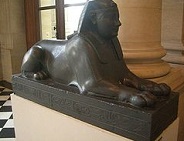

-398 Dionysius I of Syracuse attacks the Carthaginians, who rule a large part of the island of Sicily, pushing them back and sacking Motya (Mozzia) (Mothia) on the W coast. After defeating Amyrtaeus and executing him in Memphis last Oct., Nepherites (Nefaarud) I (d. -393) of Mendes (Djedet) (modern-day Tell El-Ruba) in the E Nile Delta becomes king #1 of the Egyptian 29th (XXIX) Dynasty (ends -380), going on to support Sparta in its war against Persia, sending them 500K measures of grain and material for 100 triremes; a gift sent to the Spartans is swiped as the ships pass Rhodes, which has defected to the Persian side - the first Rhodes scholarships? After witnessing Socrates' death and fleeing to his hometown and offering refuge his other pupils, Greek Socratic philosopher Eucleides (Euclides) (Euclid) of Megara (-435 to -365) founds the Megarian School of Philosophy in Megara in N Isthmus of Corinth opposite Salamis Island, which flourishes for a cent. and produces Ichthyas, Eubulides of Miletus (known for his paradoxes, incl. The Liar Paradox), Clinomachus (first philosopher to compose treatises on the fundamental principles of Dialectics), and Thrasymachus of Corinth, and his pupil Stilpo (Stilpon) (-360 to -280), teacher of Zeno of Citium and Menedemus of Eretria; it teaches that the good is the knowledge of the one universal Being AKA God, Mind, Wisdom, Reason, and alone exists; "The Good is One, but we can call it by several names, sometimes as wisdom, sometimes as God, sometimes as Reason"; "The opposite of Good does not exist"; too bad, the doctrine is so patently absurd that the Megarians reverse Socrates' heuristic method into the eristic method of concentrating on finding something wrong in opponents' arguments, using Zeno of Elea's reductio ad absurdum technique to the max. Socrates' pupil Phaedo of Elis (namesake of Plato's dialogue Phaedo) returns to Elis and founds the Elean School of Philosophy; after his death Phaedo's and Stilpo of Megara's pupil Menedemus of Eretria (-345 to -260) transfers the school to Eretria in Euboea. Roman consuls: Marcus Fabius Ambustus and Titus Quinctius Poenus Capitolinus Crispinus ("curly-haired"). Roman consuls: Lucius Valerius Potitus and Marcus Valerius Lactucinus Maximus and Marcus Furius Camillus and Lucius Furius Medullinus and Quintus Servilius Fidenas and Quintus Sulpicius Camerinus Cornutus.
-397 Messina is destroyed by Carthage under Himilco, who is then forced to give the city up to Dionysius I, tyrant of Syracuse, who rebuilds the city. The Carthaginian stronghold of Motya in Sicily is taken by the army of Syracuse using their new arrow-throwing catapult. Roman consuls: Lucius Julius Iullus and Lucius Furius Medullinus and Lucius Sergius Fidenas and Aulus Postumius Albinus Regillensis and Publius Cornelius Maluginensis and Aulus Manlius Vulso Capitolinus. Births: Greek ruler of Bithynia (-376 to -326) Bas (d. -326); son of Boteiras; father of Zipoites (-354 to -278). Greek Macedonian gen. Antipater (d. -319).


-396 The 96th Olympiad; a team owned by Spartan princess Cynisca (Kyneska) (Lat. "little puppy") wins the 4-horse chariot race, and again in -392. Mt. Etna in E Sicily erupts, with a fiery tongue of lava snaking down into the sea, causing a Carthaginian fleet sieging Syracuse to retreat, after which Syracuse ultimately wins the war (begun -409). Carthage unsuccessfully besieges Syracuse, and the latter ultimately wins the war (begun -409). Dercyllidas goes against the orders of the ephors and makes a truce with the Persians, allowing the latter to build up their fleet and put renegade Athenian Conon in command; Aegesilaus II replaces Dercyllidas as Spartan commander in Asia Minor, and he campaigns in Phrygia, defeating Tissaphernes' army, but is unable to defeat the Persian fleet; Persian satrap Pharnabazus sends Timocrates of Rhodes to bribe the leaders of Athens, Thebes, Corinth, and Argos to attack Sparta. Sparta refuses to hand over the Greek cities in Asia Minor as promised during the Peloponnesian War, and battles Persia over them. Military pay is introduced in Rome to pump up the 10-y.-o. Siege of Veii, an Etruscan city 10 mi. NW of Rome, which is captured and destroyed by Roman dictator Marcus Furius Camillus (-447 to -365); the Romans annex the region, doubling their territory, and begin to absorb the Etruscans (claiming that Juno, the patron goddess of Veii had deserted them for Rome, building a statue to her in Rome to prove it?), but this gives the Celts their opening - we're moving on up, to the east side? Orestes dies, and Aeropus II (d. -394) becomes king of Macedonia (until -394). Roman consuls: Marcus Furius Camillus (dictator) and Lucius Titinius Pansa Saccus and Publius Licinius Calvus Esquilinus and Publius Maelius Capitolinus and Quintus Manlius Vulso Capitolinus and Gnaeus Genucius Augurinus and Lucius Atilius Priscus. Nonfiction: Plato writes his Apology in defense of his master Socrates; "I shall never alter my ways, not even if I have to die many times." Births: Athenian statesman-orator Lycurgus (d. -324) (b. -390?). Greek Platonic philosopher-mathematician Xenocrates (d. -314) in Chalcedon.
-395 The Corinthian War begins (ends -387), pitting Athens and its allies Boeotia, Corinth, Argos, Megara, and Euboea against Sparta. Hecatomnus of Mylasa (Hekatomnos) (d. -377) becomes Persian satrap of Caria (Turkey), founding the Hecatomnid Dynasty (ends -334) with his five children, who rule in succession until Alexander III the Great conquers them. Pausanias dies, and next year his son Agesipolis I (d. -380) becomes Agiad king #21 of Sparta (until -380). Roman consuls: Publius Cornelius Cossus and Publius Cornelius Scipio and Kaeso Fabius Ambustus and Lucius Furius Medullinus and Quintus Servilius Fidenas and Marcus Valerius Lactucinus Maximus. Births: Greek sculptor Scopas (d. -350) in Paros; known for quadrilateral heads with deep sunken eyes and slightly opened mouth.
-394 The Athenian fleet is restored. Spartan king Agesilaus II returns to Greece with most of his force, then scores two hollow Vs over Thebes and its Greek allies at the Battle of the Nemea and the 2nd Battle of Coronea (1st in -447), losing his fleet to the Persian fleet under Conon at the naval Battle of Cnidus, and failing to establish Spartan hegemony as Persia grants autonomy to the Greek cities of Asia Minor and withdraws its garrisons, causing the Ionians to revolt from Sparta and establish democracies; Xenophon of Athens fights with the Lacedaemonians against the Athenians at Coronea, and is exiled from Athens. The Romans under Marcus Furius Camillus successfully siege the Etrurian (Etruscan) city of Falerii 30 mi. N of Rome, and Camillus goes into retirement in Ardea (until -391). Roman consuls: Marcus Furius Camillus and Lucius Furius Medullinus and Gaius Ameilius Mamercinus and Lucius Valerius Poplicola and Spurius Postumius Albinus Regillensis and Publius Cornelius.

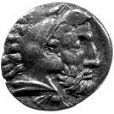
-393 On Aug. 5 emperor (since -477) Koushou dies, and Kouan (Koan) (-427 to -291) becomes Yamato emperor #6 of Japan (until -291) - is it radioactivity in the waters, like those that created Godzilla? Nepherites I dies, and next year usurper Psammuthes (Pasherienmut) (d. -391) seizes power from his son Hakor, becoming king #2 of the Egyptian 29th Dynasty. Conon returns to Athens and begins rebuilding the Long Walls. Athens recovers Delos, Imbros, Lemnos, and Scyros, and makes alliances with Chios, Cnidus, Cos, Mitylene, and Rhodes. Aeropus II dies, and his son Pausanias becomes king of Macedon, but he is assassinated by Amyntas III the Little (d. -370) (father of Philip II), who becomes king of Macedon until he is driven out by the Illyrians, after which Archelaus II, son of Archelaus I and brother of Orestes becomes king of Macedon (until -387), becoming a patron of art and lit. Roman consuls: Lucius Valerius Potitus and Publius (Servius) Cornelius Maluginensis. Deaths: Japanese Yamato emperor #5 (-475 to -393) Koushou on Aug. 5.

-392 The 97th Olympiad. Nepherites I's son Hakor (Hagar) (Achoris) (Hakoris) (d. -380) overthrows Psammutes, becoming king #3 of the 29th Egyptian Dynasty. Dionysius I gives up on his war with the Carthaginians after failing to drive them out of Sicily. Persia deposes Conon, who soon dies; in the winter a peace conference is held at Sparta, but the Athenians reject its terms. Amyntas III recovers his kingdom (until -370) with help from the Thessalians under Medius, head of the house of the Aleuadae of Larissa. Roman consuls: Lucius Valerius Potitus and Marcus Manlius Capitolinus. Plays: Aristophanes (-448 to -380), The Ecclesiazusae. Births: Greek Athenian orator Hypereides (Hyperides) (d. -322); student of Isocrates.
-391 Roman consuls: Lucius Lucretius Tricipitinus Flavus and Servius Sulpicius Camerinus and Lucius (Marcus) Aemilius Mamercinus and Lucius Furius Medullinus and Agrippa Furius Fusus and Gaius Aemilius Mamercinus. Deaths: Chinese philosopher Mo Tzu (b. -470) - keep your mo tzu running?
-390 The Spartan fleet captures Samos, then an Athenian army under Iphicrates (d. -353) defeats the Spartans at the Battle of Lechaeum; Evagoras revolts from the Persians in Cyprus. Dionysius I of Syracuse begins the conquest of S Italy (Magna Graecia) (ends -379). Argaios II becomes king of Macedonia (until ?). Tharrhypas dies, and his son Alcetas I of Epirus (d. -370) becomes king of Epirus (until -370). Roman consuls: Marcus Furius Camillus (dictator) and Quintus Fabius Ambustus and Kaeso Fabius Ambustus and Numerius Fabius Ambustus and Quintus Sulpicius Longus and Quintus Servilius Fidenas and Publius Cornelius Maluginensis. Births: Greek Athenian orator Hypereides (Hyperides) (d. -322). Greek sculptor Lysippus (Lysippos) (d. -300) in Sicyon; personal sculptor of Alexander III the Great; teacher of Chares of Lindos; known for a one-to-eight scale for the head and total height of the body, making them appear slender and taller, with exaggerated facial features. Deaths: Athenian orator Andocides (b. -440); leaves Speeches of Andocides.
-389 The Athenian navy under Thrasybulus recovers Thasos, Samothrace, Tenos, Chersonesus, Byzantium, Chalcedon, et al., placing garrisons in the most important towns and imposing a 5% harbor toll. Dionysius I of Syracuse defeats the Italiote (Greek) League at the Battle of the Elleporus. The plebeians propose that Rome be abandoned for Veii, but Marcus Furius Camillus gets the proposal defeated and the city begins to be rebuilt. Marcus Manlius begins spending his fortune in releasing debtors trapped by the ursury of the patricians, but the latter eventually 'get' him by having him accused of tyrannical intentions, condemned as a traitor, and flung from the Tarpeian Rock on the edge of the Capitoline Hill he had once defended - do you have any trouble breathing? Amyntas III (d. -369) (father of Philip II) becomes king of Macedon (until -369). Roman consuls: Marcus Furius Camillus (dictator) and Lucius Valerius Poplicola and Lucius Verginius Tricostus and Publius Cornelius ? and Aulus Manlius Capitolinus and Lucius Aemilius Mamercinus and Lucius Postumius Albinus Regellensis. Births:Aeschines (d. -314) in Athens.
-388 The 98th Olympiad; the first known case of cheating at the Olympics sees boxer Eupolus of Thessaly bribe three opponents to take dives. Roman consuls: Titus Quinctius Cincinnatus Capitolinus and Quintus Servilius Fidenas and Lucius Julius Iullus and Lucius Aquillius Corvus and Lucius Lucretius Flavus Tricipitinus and Servius Sulpicius Rufus. The Athenian fleet plunders Aspendus to make up for missing pay from Athens, then the enraged pop. breaks into the Athenian camp and murders Thrasybulus. After the Spartan fleet under gen. Gorgopas ambushes the Athenian fleet near Athens and captures several ships, the Athenian fleet under gen. Chabrias ambushes and defeats the Spartans on Aegina Island; the Spartans under soldier-diplomat Antalcidas conclude an agreement with Persian king Artaxerxes I for Persian aid in its war against Athens in return for Spartan recognition of Persian supremacy over the Greek cities in Asia Minor; Antalcidas then commands the Spartan fleet in aid of the Persian fleet, defeating the Athenian navy near the Hellespont and kicking them out of the Aegean Sea. Plays: Aristophanes (-448 to -380), Plutus.





-387 The Corinthian War (begun -395) ends with the King's Peace (Peace of Antalcidas), negotiated by Antalcidas of Sparta, which guarantees the autonomy of all Greek cities except those in Asia Minor, marking the imposition of Persian control over the Greek Ionian city-states. Rome gets its first Celtic Trick or Treat? The Celtic Invasion of N Italy sees the 24K-man army of the Gallic (Celtic) Senones under chieftain Brennus (Brennos) (who crossed the Alps in -400, drove out the Umbrians, and settled on the E coast of of Italy from Forli to Ancona, founding their capital of Senigallia or Sinigaglia) invade the Etruscan province of Siena from the N, then (in cahoots with Dionysius of Syracuse to cause a diversion so he can take Sicily?) siege the Etruscans at Clusium on the Allia River (a tributary of the Tiber River) in the province of Siena, causing them to call for help from the Romans, after which Marcus Fabius Anbustus, pontifex maximus of Rome (the descendant of the only remaining Fabian after the Veii wipeout of -476) sends his three sons as ambassadors, but they instead decide to fight in the final Battle of the Allia on July 18 (-390?), when the Gauls take the city after surrounding and kicking the butts of six Roman legions and chasing them back to Rome, during which confusion Quintus Fabius kills a Gaulish chieftain, causing Brennus to claim that they had violated internat. law prohibiting ambassadors from fighting, and demand that they be turned over; when the Romans refuse, and instead honor them with appointments as military tribunes with consular powers, the Gauls prepare to march on Rome; the chieftain was killed before the battle, and that's what brought it on?; either way, the Gauls become the Romans' permanent bete noir (boogey man) when they siege Rome, find the gates left open and the citizens barricaded on the Capitoline Hill, then after pausing awestruck to view the magnificent bldgs. and the city fathers stoically awaiting their fate, they sack and burn six hills, before assaulting the Capitoline Hill, which is under the command of patrician Marcus Manlius Capitolinus, who tries to send a message to the Senate to reinstate Marcus Furius Camillius (-447 to -365) as dictator; too bad, as the messenger climbs up a secret path to the Senate the Gauls find out and begin a sneak attack, but he is saved by the honking of the sacred guard dogs, er, geese of Juno?; after agreeing to pay 1K lbs. of gold to buy them off (which the Romans later take as an insult, since Rome is worth much more?), the Gauls use rigged weights on the scales, and when the Romans complain, Brennus throws his sword on the scales and utters the soundbyte: "Vae victus" (Woe to the vanquished); too bad, the goosey Gauls stay too long (7 mo.), and don't bury their dead, causing dysentery to spread, giving Marcus Manlius time to raise an army and defeat and drive them from Rome, earning him the title "Pater Patriae" and "Second Founder of Rome", allegedly putting his sword on the scales too and uttering the soundbyte: "Not gold but steel redeems the native land"; this traumatic experience is the earliest fact of Roman history dated by contemporary Greek authors; after this experience, the 12-gate Servian Wall (Murus Servii Tullii) is built around Rome by -378, and the Roman army gives up the Greek phalanx-style spear and improves its armor, weapons, and org., getting serious, and Rome is not taken again until the 5th cent. C.E.; every year on the anniv. of this year's events guard dogs are crucified on the Capitoline Hill for failing to warn of the sneak attack, while geese are brought to watch on gilded purple cushions. Back in sane sanitary Athens, Socrates' 40-y.-o. student Plato (-427 to -327) founds the Academy in the Grove of Academe (once the property of an Athenian named Academus who got his name from an ancient hero?), becoming the first univ. in the Western world; it is closed in 529 C.E. by Christian Byzantine Emperor Justinian I - because the Roman Catholic Church has the Truth hence who needs it? Roman consuls: Lucius Papirius Cursor and Gnaeus Sergius Fidenas Coxo and Lucius Aemilius Mamercinus and Licinius Menenius Lanatus and Lucius Valerius Poplicola.
-386 Dionysius I of Syracuse captures Rhegium in S Italy. The Spartan navy forces Athens to accept the King's Peace by blockading the Hellespont, then intimidates Thebes into accepting; the Boeotian and Athenian Leagues are temporarily dissolved; Ephesus is again under Persian control. The Gauls infesting Rome are bought off, and return to the Po Valley - who would ever think that Rome would rule the world? The one and only Roman jail is enlarged into the Tullianum, by Tullus Hostillius (Servius Tullius), consisting of two crypt-like rooms above each other, the top one being where they await trial, the bottom one where they are executed, going on to house Nugurtha from N Africa, Vercingetorix from Gaul, the Gracchi, and Catilina's conspirators, plus allegedly the Christian apostles Peter and Paul. Roman consuls: Marcus Furius Camillus and Servius Cornelius Maluginensis and Qintus Servilius Fidenas and Lucius Quinctius Cincinnatus and Lucius Horatius Pulvillus and Publius Valerius Potitus Poplicola.
-385 The Persians unsuccessfully invade Egypt. Camissares dies, and his son Datames (d. -362) becomes Persian satrap of Cappadocia (until -362). Roman consuls: Aulus Cornelius Cossus (dictator) and Aulus Manlius Capitolinus and Publius Cornelius ? and Titus Quinctius Cincinnatus Capitolinus and Lucius Quinctius Cincinnatus Capitolinus and Lucius Papirius Cursor and Gnaeus Sergius Fidenas Coxo. Deaths: Greek philosopher Philolaus of Croton (b. -480).
-384 The 99th Olympiad. Sparta ends a long siege of Mantinea, dismantling its walls and breaking up the city into five villages. Roman consuls: Servius Cornelius Maluginensis and Publius Valerius Potitus Poplicola and Marcus Furius Camillus and Servius Sulpicius Rufus and Gaius Papirius Crassus and Titus Quinctius Cincinnatus. Nonfiction: Plato (-427 to -327), Symposium; discussion on the nature of love by men at a drinking party at the house of Athenian tragedian Agathon; Aristophanes claims that there are three genders, gay male, lesbian female, and heterosexual - and homosexual behavior among men is natural, as is lesbian behavior among females, while heterosexual behavior must be learned, therefore the weird anti-sexual Christian cult that develops centuries from now is profoundly sick, wasting human happiness by denying the pleasures of the flesh and making life not worth living, so no wonder it brings on a Dark Ages of looney tunes hoping the world will end any minute so they can become as angels and not have to worry about sex, while avoiding taking baths? Births: Greek Golden Mean philosopher (the first scientist?) (founder of the Lyceum) ("the Peripatetic Philosopher") (gay?) Aristotle (Gr. "best (purpose) of all") of Stagira (d. -322) in Stagira (Stageira), Macedonia; tutor of Alexander III the Great, teaching him that non-Greeks should be treated as slaves. Greek statesman-orator Demosthenes (d. -322) in Athens; orphaned at age 8; gives first public political speech in -354, preaching against the expansion of Philip II of Macedonia.
-383 Dionysius I of Syracuse begins another war with Carthage (ends -381). Roman consuls: Lucius Valerius Poplicola and Aulus Manlius Capitolinus and Servius Sulpicius Rufus and Lucius Lucretius Flavius Tricipitinus and Lucius Aemilius Mamercinus and Marcus Trebonius.
-382 After an appeal from Amyntas II of Macedonia, Sparta goes to war with the Chalcidian League (led by the city of Olynthus), sending 10K soldiers, who seize the Theban citadel of Cadmea and turn it over to the oligarchic party, causing the democratic party to flee to Athens; the Spartans then march to the Chalcidice, where they are defeated - I'm the survivor, not you? Roman consuls: Spurius Papirius Crassus and Lucius Papirius Mugillanus and Servius Cornelius Maluginensis and Quintus Servilius Fidenas and Gaius Sulpicius Camerinus and Lucius Aemilius Mamercinus. Births: Macedonian king (-359 to -336) Philip II of Macedon (Macedonia) (d. -336) in Pella; youngest son of Amyntas III the Little (d. -370); younger brother of Perdiccas III; father of Alexander III the Great (-357 to -323). Greek Macedonian gen. Antigonus I Cyclops (Monophthalmos) (One-Eyed) (d. -301); father of Demetrius I Poliorcetes (Poliorketes) (the Besieger) (d. -283).
-381 The Persians defeat Cyprus and destroy their fleet. Carthage kicks Dionysius I's butt at the Battle of Cronium, causing him to end his war, pay an indemnity of 1K talents, and cede the territory W of the Halycus River by -378. Sparta sends a 2nd expedition led by King Agesilas to Olynthus, which sieges and captures the city and dissolves the Chalcidian League (until -379); Agesilaus is KIA. Roman consuls: Marcus Furius Camillus and Aulus Postumius Regillensis and Lucius Postumius Regillensis and Lucius Furius Medullinus and Lucius Lucretius Tricipitinus Flavus and Marcus Fabius Ambustus.
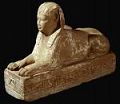
-380 The 100th Olympiad. Hathor dies, and his son Nepherites (Nefaarud) II (d. -380 becomes king #3 of the Egyptian 29th Dynasty, ruling only 4 mo. until army gen. Nectanebo (Kheperkare Nakhtnebet) I (d. -360) of Sebennytos overthrows him, becoming king #1 of the Egyptian 30th (XXX) Dynasty (ends -343) (last dynasty with Egyptian-born rulers), and successfully turns back the Persians, building a great Temple of Isis on Philae, an island in the Nile (closed 537 C.E.), causing the cult to spread throughout the Hellenic world in this cent.; Isis (later identified with the Greek goddess Demeter) is the daughter of the Earth and Sky (Keb and Nut), wears cow horns, has the personality of Athor (goddess of love and gaiety), marries her brother Osiris (Serapis) (judge of the dead), and has son Horus (god of day) - the original Hollywood couple? Agesipolis I dies, and his brother Cleombrotus I (d. -371) becomes Agiad king #22 of Sparta (until -371). Rome is rebuilt under an alliance with the Samnites of the S Apennines. Roman consuls: Titus Quinctius Cincinnatus (dictator) and Lucius Valerius Poplicola and Publius Valerius Potitus Poplicola and Servius Cornelius Maluginensis and Licinus Menenius Lanatus and Gaius Sulpicius Peticus and Lucius Aemilius Mamercinus and Gnaeus Sergius Fidenas Coxo and Tiberius Papirius Crassus and Lucius Papirius Mugillanus. Nonfiction: Plato (-427 to -347), The Republic (Res Publica); a Socratic dialogue that postulates the ideal state of Kallipolis, with philosopher kings "who love the sight of truth" (475c), at the top of a class society of alpha (rulers) (reason), beta (warriors) (spirit), delta (workers) (appetite) people; contains references to specialization of labor and production; "Until philosophers rule as kings or those who are now called kings and leading men genuinely and adequately philosophize, that is, until political power and philosophy entirely concide, while the many natures who at present pursue either one exclusively are forcibly prevented from doing so, cities will have no rest from evils... nor, I think, will the human race" (473c-d); becomes the first known advocate of the Credit Theory of Money, which claims that money originated as a unit of account for debt, and that money creation involves the simultaneous creation of money and debt, meaning that they're really the same thing. Births: Greek navigator-geographer Pytheas of Massilia (d. -300) in Massilia (Marseille), Gaul. Greek sophist philospher Anaxarchus (d. -320) in Abdera, Thrace. Greek historian Theopompus (d. -315) in Chios. Deaths: Greek dramatist Aristophanes (b. -448); leaves 40-44 plays, of which 11 survive to modern times: "Youth ages, immaturity is outgrown, ignorance can be educated, and drunkenness sobered, but stupid lasts forever" - big day for birds, frogs, etc.?

-379 Dionysius I of Syracuse finishes conquering S Italy. Theban democratic exiles led by (freedom fighter?) Pelopidas (d. -364) and Epaminondas conspire with Athens against the Spartan hegemony in Cadmea, recovering it by a stratagem, massacring the Spartan tyrants and establishing a democracy, causing two Athenian generals who aided the Thebans to be executed for operating without authority; Sparta does not directly intervene, but leaves Sphodrias with a garrison at Thespiae, and lets him operate without authority and raid Attica; Athens allies with Thebes against Sparta. Marsala on the W coast of Sicily is founded by the Carthaginians. Roman consuls: Publius Manlius Capitolinus, Gaius Manlius ?, Lucius Julius Iullus, Gaius Sextilius ?, Marcus Albinius ?, Lucius Antistius ?, Publius Trebonius ?, Gaius Erenucius ?.
-378 Timotheus (Timotheos), son of gen. Conon is elected strategos of Athens; Spartan king Agesilaus II is assigned the campaign against Thebes and Athens, and reorganizes the Peloponnesian League, forming 10 districts, each responsible for sending men or money, sending punitive expeditions into Boetia, prompting counterstrikes by Thebes, which is now commanded by Epaminondas, and attempting to seize Piraeus, driving Athens closer to Thebes, forming the Second Athenian Empire (ends -355), incl. most of the cities of Boeotia and some of the Ionian islands as a successor to the Delian League, after which the Spartans under Phoebidas are routed by the Thebans aided by the Athenians under gen. Chiabras at the Battle of Thespiae, liberating Thebes, with Phoebidas KIA; Chiabras wows the Spartans with a new battle maneuver of defending against a charge by resting on the left knee with shields resting on the ground and spears pointed forward; the new Athenian empire is much diminished in power, wealth, and influence, with Athens giving up all claims to its cleruchies and letting an allied council (synhedrion) rule jointly with the Athenian assembly (ecclesia). Etruscan actors stage the first theatrical performances in Rome. Roman consuls: Spurius (Lucius) Furius ?, Quintus Servilius Fidenas, Licinus Menenius Lanatus, Publius Cloelius Siculus, Marcus Horatius ?, Lucius Geganius Macerinus.

-377 Hecatomnus dies, and is succeeded by Mausollos (Mausolus) (d. -353) as virtually independent Persian satrap of Caria (Turkey), embarking on an expansionist policy. Greek sculptor Scopas (-395 to -350) of Paros moves to Athens, working there with Praxiteles for 25+ years, building the new Doric Temple of Athena Alea in Tega after the old one burns down in -394, with an ivory statue of Athena made by Endoeus (Endoios), which Augustus later moves to the Forum of Augustus in Rome; Scopas and Praxiteles found the Late Attic School of Sculpture. Roman consuls: Lucius Aemilius Mamercinus and Publius Valerius Potitus Poplicola and Gaius Veturius and Servius Sulpicius Rufus and Lucius Quinctius Cincinnatus and Gaius Quinctius Cincinnatus. Deaths: Greek physician Hippocrates of Cos (b. -460) in Larissa, Thessaly; Aristotle later calls him the "great physician": "Primum non nocere" ("The first rule is do no harm"); "Let food be thy medicine and medicine be thy food"; leaves the Hypocritical Kevorkian, er, Hippocratic Oath (attributed to him later?): "I swear by Apollo, the physician, by Aesculapius, by Hygieia, Panacea, and all the gods and goddesses... The regimen I adopt shall be for the benefit of my patients according to my ability and judgment, and not for their hurt or for any wrong. I will give no deadly drug to any, though it be asked of me, nor will I counsel such, and especially I will not aid a woman to procure abortion..."; also leaves Aphorisms; "Life is short, and Art is long" (Vita breva, Ars longa) - is there a doctor in the Acropolis?

-376 The 101st Olympiad. Callistrate is elected ruler of Athens. On the main day of the Eleusinian Mysteries, the Athenian fleet under gen. Chabrias, aided by up-and-coming gen. Phocion (Phokion) the Good (-402 to -318) (pupil of Plato) crushes the Spartan fleet in the naval Battle of Naxos, giving Athens control of the sea, becoming the first Athenian V since the Peloponnesian War; Chabrias breaks off from annihilating the Spartan fleet to pick up survivors so he doesn't end up like the gens. of the 406 B.C.E. Battle of Arginusae; the V makes Phocion a big man, and he proves his wisdom and works to earn his nickname "The Good" by going out to collect regional tributes in a single ship instead of the 20 offered, with the soundbyte "If I was being sent to fight the pesky islanders I would need a larger force, but since I'm visiting them as allies, one is enough". Thebes restores the Boeotian League on a democratic basis. Bas of Bithynia (-397 to -326), son of Boteiras becomes the first independent prince of Bithynia in NW Asia Minor (until -326), defeating Alexander I the Great's gen. Calas to maintain independence. The Thracian city of Abedera is sacked by the Thracian Triballi tribe from the South Morava, West Morava, and Iskar Rivers at the Sebian-Bulgarian border. Gaius Licinius Calvus Stolo, one of the 1- tribunes for the people begins making proposals which attempt to give the plebeians a fair shake vis a vis the patricians, causing a 10-year power struggle. Roman consuls: Lucius Papirius (Mugillanus) and Licinus Menenius Lanatus and Servius Cornelius Maluginensis and Servius Sulpicius Praetextatus. Deaths: Chinese king An of Zhou in King Lie (King Xian).
-375 Beginning of five years of anarchy in Rome, with no curule magistrates elected. The Zheng Kingdom in China is eliminated by the Han Jingdom, er, Kingdom. Zhou An Wang dies, and his son Zhou Lie Wang (d. -368) becomes Dong Zhou king #21 of China. Births: Greek mother of Alexander III the Great Olympias (d. -316); daughter of Neptolemus I of Epirus; 4th wife of Philip II of Macedon; mother of Alexander III the Great (-356 to -323); high priestess of the orgiastic snake-worshipping cult of Dionysus on Lesbos. Greek historian-architect Aristobulus of Cassandreia (d. -301) in Cassandreia. Greek physician ("the Younger Hippocrates") Diocles (Medicus) of Caryst(i)us (d. -295) in Carystus, Euboea.
-374 Persia unsuccessfully invades Egypt; about this time Persians finally give up putting their retro cuneiform on monuments (begun -570). Deaths: Greek king of Salamas (-410 to -374) Evagoras (b. ?) in Cyprus (assassinated by a eunuch for revenge).
-373 The city of Helice in Achaea, Greece is destroyed by an earthquake containing "immense columns of flame", becoming the first recorded instance of earthquake lights; at night a tsunami from the Corinthian Gulf inundates what's left, killing the entire pop.; the city of Boura further inland is also destroyed.
-372 The 102nd Olympiad. Births: Chinese philosopher Mencius (Meng-tse) (Meng Ke) (d. -289); disciple of Confucius, becoming the 2nd most famous Confucian after him.

-371 In the summer Sparta and the Theban allies reach a general peace settlement, but Spartan King Agesilaus II torpedoes it by singling Thebes out of its terms and not letting Theban king Epaminondas sign on behalf of all Boeotia, then sending Spartan troops under King Cleombrotus I to chastize Thebes; they meet in battle in only 3 weeks, but it backfires, and Sparta's 700 warrior citizens and 1.3K slave soldiers are soundly defeated by 6K Theban warriors at the Battle of Leuctra (Leuktra); Sparta loses 400 of its 700 remaining full citizens (officers) and never recovers; the city of Megalopolis (Gr. "big city") is founded in the prefecture of Arcadia by Epaminondas to celebrate his V as the seat of the Arcadian League; Sparta's hegemony over Greece is shattered, and Boeotia begins dominating Greece (until -338); Thebes withdraws from the Athenian League along with the cities in Acarnania, Euboea, and the Chalcidice; Cleombrotus I dies, and his son Agesipolis II (d. -369) becomes Agiad king #23 of badly sprained Sparta (until -369). Nonfiction: Xenophon of Athens (-431 to -354), Anabasis (Gr. "An Ascent") (7 vols.) (an expedition from a coastline to the interior of a country, as opposed to katabasis, from the interior to the coast); about the Greek expedition of the Ten Thousand against Artaxerxes II of the Persians and the long journey home after their sponsor Cyrus the Younger is KIA in Babylon at the 401 B.C.E. Battle of Cunaxa; how Spartan gen. Clearchus, the leader of the Ten Thousand is treacherously murdered in a conference by Tissaphernes, leaving Xenophon as one of the last three leaders of the soldiers, bravely leading them N from N Mesopotamia through Corduene and Armenia to the Black Sea at Trebizond; upon encountering some barbarians (Celts?), he puzzles about their strange drink: "There were stores within of wheat and barley and vegetables, and wine made from barley in great big bowls; the grains of barley malt lay floating in the beverage up to the lip of the vessel, and reeds lay in them, some longer, some shorter, without joints; when you were thirsty you must take one of these into your mouth, and suck. The beverage without admixture of water was very strong, and of a delicious flavor to certain palates, but the taste must be acquired." (Book IV) Births: Greek Peripatetic philosopher-botanist Theophrastus (Tyrtamus) (d. -287) in Eresus (Eressos), Lesbos; pupil of Aristotle (-384 to -322), who nicknames him Theophrastus for his cunning, er, graceful conversation.
-370 The Satraps Revolt results after Datames of Cappadocia et al. decide it's too risky to obey the Persian king Artaxerxes III's orders to recover Egypt; a Persian army from Pisidia led by gen. Artabazus is defeated by Datames, followed by another led by Autophradates. Amyntas III dies, and Alexander II (d. -368) becomes king of Macedonia. Alcetas I dies, and his son Neoptolemus I of Epirus (d. -357) becomes king of Epirus (until -357), claiming to be a descendant of Greek hero Achilles as well as king Lycomedes. The Arcadian League is formed under Theban protection as a counterweight to Sparta, and the city of Mantinea is restored; the league is ruled by the Ten Thousand, a gen. assembly of all freeborn citizens, meeting in Megalopolis. The Thebans under Epaminondas liberate the exiled Messenians from Sparta, and they return to the Peloponnesus next year, founding Messene (Messenia), with Pylos as its main port. Roman consuls: Lucius Furius Medullinus and Aulus Manlius Capitolinus and Servius Sulpicius Praetextatus and Servius Cornelius Maluginensis and Publius Valerius Potitus Poplicola and Gaius Valerius Potitus. Births: Greek king of Epirus (-342 to -330) Alexander I Molossus (d. -330); son of Neoptolemus I (d. -357); brother of Olympias (-375 to -316) (mother of Alexander III the Great); son-in-law of Philip II of Macedon (-382 to -336); husband of Cleopatra of Macedonia (daughter of Philip II); father of Neoptolemus II (d. -297). Greek sculptor Praxiteles (d. -330) in Athens; known for his statue of a faun? Macedonian Diadochi gen. Craterus (d. -321); son of Alexander of Orestis; brother of Amphoterus. Deaths: Greek philosopher Democritus (b. -460): "There is nothing but atoms and the void".
-369 Agesipolis II dies, and his brother Cleomenes II (d. -309) becomes Agiad king #24 of Sparta. Athens and Sparta make an alliance on equal terms, while Thebes works to unite all of Thessaly (except Pherae) under a single archon. Roman consuls: Quintus Servilius Fidenas and Gaius Veturius and Aulus Cornelius Cossus and Marcus Cornelius Maluginensis and Quintus Quinctius Cincinnatus and Marcus Fabius Ambustus. Births: Chinese Taoist pantheist philosopher Chuang-tzu (d. -286).
-368 The 103rd Olympiad. The patricians abuse their power of setting up a dictator in time of military necessity, appointing Camillus (hero of Veii, and butt-kicker of the Falerii, Gauls, Aequi, Volsci and Etrusci), and Capitolinus; unfortunately for the patricians, Camillus is big enough to compromise with the plebeians - I need your strength, I need your tender touch? Alexander II dies, and Ptolemy (Ptolemaeus) (Pteolemaios) (Gr. "warlike") Alorites (d. -365) becomes king of the Massy Mountains of Macedonia. Zhou Lie Wang dies, and Zhou Xian Wang (d. -320) becomes Dong Zhou king #22 of China. Roman dictators: Marcus Furius Camillus and Publius Manlius Capitolinus. Roman consuls: Titus Quinctius Cincinnatus Capitolinus and Servius Cornelius Maluginensis and Servius Sulpicius Praetextatus and Spurius Servilius Structus and Lucius Papirius Crassus and Lucius Veturius Crassus Cicurinus.

-367 Rome begins a series of four wars with the Gauls in C Italy (ends -349); 80-y.-o. Marcus Furius Camillus is made dictator for the 5th time; the Gauls siege Rome, after which Camillus defeats them near Alba; he then concedes the demands of the plebeians (plebs), dedicates a temple to Concord, and resigns; pleb tribunes Gaius (Caius) Licinius Calvus Stolo and Lucius Sextius Lateranus pass the Lex Licinia Sextia (Licinian-Sextian Rogations) (sounds like licentious sexual regulations?), which limit the amount of public land (500 iugera, or 2,500 eighths of an acre) and cattle a citizen can have, cutting down the few greedy patricians to size; debts can be forgiven by the payment of the principal only; the office of consular tribune is abolished, and henceforth at least one of the two consuls must be a plebeian; two patrician curule aediles are created to match the plebeian ones; the office of praetor urbanus is created; the duumviri (Duoviri) (two men of patrician status with priestly duties) who guard the Sibylline Books is increased to 10, with half of the priests required to be plebs; the plebeian-patrician struggle begins to go away as the line between them blurs, and within a cent. Rome is ruling and unifying all Italy from the Arno River (source at Mt. Falterona in the Apennines) to the Straits of Messina - party's over: breakthrough? After entering into an alliance with Athens, Dionysius I the Elder, known for competing at the Athenian drama festivals and having fun with Damocles (having a sword hanging by a hair suspended over his head at a banquet to teach him the insecurity of the most fortunate) dies in the spring during a war with Carthage, and his weak son Dionysius II (the Younger) (-395 to -343) becomes tyrant of Syracuse (until -356) under the regency of his uncle Dion, who immediately makes peace with Carthage; during the reign of Dionysius the Younger, Pythagorean philosophers Damon and Phintias (Pythias) gain fame when Phintias is condemned to death for treason, and requests home leave to arrange his affairs, with Damon offering to remain as hostage; Phintias is delayed and Damon is about to be executed, and is saved just in time when Phintias returns, impressing Dionysius so much that he pardons Phintias and asks to become friends with them both. Pro-Persian Spartan leader Antalcidas commits suicide. Philip of Macedon, youngest son of Amyntas II is captured by the Thebans and held hostage at Thebes for the next 3 years (until -364), using the opportunity to learn the A-1 Theban military techniques - which means that we oughtn't to a done that, right? Roman consuls: Marcus Furius Camillus (dictator) and Aulus Cornelius Cossus and Marcus Cornelius Maluginensis and Marcus Geganius Macerinus and Publius Manlius Capitolinus and Lucius Veturius Crassus Cicurinus and Publius Valerius Potitus Poplicola. Births: Macedonian Greek gen. and king #1 of the Egyptian 32nd (Ptolemaic) Dynasty (-305 to -283) Ptolemy I Soter (Gr. "savior") (Lagides) (d. -283); son of Lagus; general of Alexander the Great, and founder of the Ptolemaic (Lagid) Dynasty in Egypt; father of Ptolemy II (d. -246). Deaths: Syracuse tyrant Dionysius I the Elder (b. -430) in the spring.
-366 The first plebeian consul and the praetorship are created in Rome. Athenian gen. Chabrias is accused of treachery for advising the surrende of Oropus to the Thebans, and is acquitted, but bolts to Egypt, where he accepts a command under king Teos to fight the pesky Persians. Plato travels to Syracuse at the urging of Dionysius II's son-in-law Dion to set up a perfect state with Dionysius as a philosopher-king; by next year both Dion and Plato are expelled. Orontes I dies, and his son Orontes II (-336 to -325) becomes Persian satrap of Armenia (until -331). Roman consuls: Lucius Aemilius Mamercinus and Lucius Sextius Sextinus Lateranus (first plebeian consul). Architecture: The Temple of Concordia in Rome is built.


-365 Nectanebo I dies, and his son Djeho (Teos) (Tachos) (-360) becomes ruler #2 of the 30th Egyptian Dynasty (until -360); he plans an attack on the Persians but ends up fleeing to them for refuge instead. Ptolemy Alorites is killed by Perdiccas (Perdikkas) III (d. -359), who becomes king of Macedonia (until -359). The pro-Spartan party of Callistratus in Athens is replaced by the party of Timotheos, who is elected strategos of Athens; peace is made with Thebes on the basis of the status quo, then Athens breaks its promise and sends a cleruchy to garrison its ally Samos. Roman consuls: Lucius Genucius Aventinensis and Quintus Servilius Ahala. Births: Greek Cynic philosopher (lame) (hunchback) Crates of Thebes (d. -285) in Thebes; teacher of Zeno of Citium (-334 to -262). Deaths: Roman soldier-statesman Marcus Furius Camillus (b. -447). Greek philosopher Eucleides of Megara (b. -435) in Megara.


-364 The 104th Olympiad. Tyrant (since -369) Alexander of Pherae is defeated by Thebes in the Battle of Cynoscephalae; Theban gen. Pelopidas is KIA; Philip of Macedon returns to Macedon, and his older brother Perdiccas III appoints him gov. of a Macedonian principality. 80-y.-o. Agesilaus II tries to sell his services as a gen. to the Egyptians to make money for ailing Sparta, but the sight of the shriveled warrior only makes them laugh? Roman consuls: Gaius Sulpicius Peticus and Gaius Licinius Stolo. Art: About this time possibly legendary Athenian sculptor Praxiteles (Gr. "he who finishes his works"), sculpts a statue of Aphrodite of Knidos (Venus Pudica) (Modest Venus), modeled by Thespian courtesan Phryne (b. -371), becoming the first to sculpt the life-size nude female form, along with the statue of Hermes of Praxiteles (Olympia) and the Infant Dionysus; rediscovered in 1875 C.E. - this stupid knife dispenser is stuck? Births: Greek scholar gen. Eumenes of Cardia (d. -316) in Cardia, Thracian Cheronese; starts out as private secy. to Philip II of Macedon and Alexander III the Great. Deaths: Theban gen. Pelopidas (b. ?).
-363 Epaminondas leads a Theban army into Thessaly, and again defeats Alexander of Pherae. Athens subjects its allies Ceos and Naxos to its jurisdiction. Roman consuls: Lucius Manlius Capitolinus Imperiosus (dictator) and Gnaeus Genucius Aventinensis and Lucius Aemilius Mamercinus.
-362 On July 4 the Second Battle of Mantinea becomes Sparta's 3rd military D in history as the Thebans kick their butts while losing their military hero Epaminondas, along with his male lover Caphisodorus, who are buried together like husband and wife; Sparta is occupied by a Theban army; the Mycenaean Helot slaves (the backbone of the Spartan army, since true Spartans have resisted expansion of their ranks until only a few hundred remain) are liberated; this is the end of Sparta as a significant force in Greek politics, supplanted by Thebes (until -338). The Arcadian League breaks up, and oligarchs take control of many of its cities. The Romans begin a series of wars with the Hernici and other Latin cities (ends -345). After Artaxerxes III gives up on taking him in a straight fight, Datames is assassinated by a conference by his hit man double-agent Mithridates II of Cius (-386 to -302), son of Ariobarzanes II, going down as the greatest non-Greek and non-Roman general other than Hannibal and Hamilcar; Artaxerxes III's son Ariamnes I (d. -330) becomes Persian satrap of Cappadocia (until -330). Roman consuls: Appius Claudius Crassinus Regillensis and Quintus Servilius Ahala and Lucius Genucius Aventinensis. Deaths: Indian king Mahapadma Nanda (b. -450).
-361 Aristophon and Ebolos are elected rulers of Athens, which sends a cleruchy to occupy Potidaea. Athenian adm. Leosthenes (d. -323) is sent to take on Alexander, tyrant of Pherae, but is surprised and defeated, losing five triremes and 600 men, getting condemned to death as punishment. Roman champion Titus Manlius Imperiosus Torquatus defeats a Gallic champion in single combat near the Anio River, taking his torque (collar) and gaining his nickname - the first Roman Rocky? Roman consuls: Titus Quinctius Pennus Capitolinus Crispinus (dictator) and Gaius Licinius Calvus and Gaius Sulpicius Peticus. Births: Greek tyrant of Syracuse (-317 to -289) and king of Sicily (-304 to -289) Agothocles (d. -289) in Thermae Himeraeae (modern-day Termini Imerese), Sicily; brother of Antander. Greek Macedonian gen. Lysimachus (d. -281) (b. -355?) in Crannon (Pella).
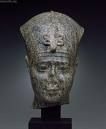

-360 The 105th Olympiad. Nectanebo II (d. -343) becomes the 3rd and last ruler of the Egyptian 30th Dynasty; Persia attacks, and he flees to Ethiopia. Agesilaus II dies, and his son Archidamus III (d. -338) becomes king of Sparta. Yitha'a Amar Bayyin II (d. -350) becomes the last makrab king of Saba, after which they lose control of the surrounding states and revert back to mere kings. Nonfiction: Xenophon of Athens (-429 to -354), Oeconomicus; about household mgt. and agriculture, becoming the first Greek text on economics. Births: Greek skeptic philosopher (first) Pyrrho of Elis (d. -270) in Elis; founder of the Greek Skeptic School; teaches that man is unable to know the real nature of the world or how it came into being (acatalepsia), and that instead of searching for the unknowable, men should be practical, follow custom, and accept the evidence of their senses, freeing themselves from worry (ataraxia) - if only man could settle for that? Roman consuls: Quintus Servilius Ahala (dictator) and Marcus Fabius Ambustus and Gaius Poetelius Libo Visolus. Births: Macedonian gen. Perdiccas (d. -320); descendant of the princes of Orestis. Greek Megarian philosopher Stilpo (Stilpon) (d. -280) in Megara; teacher of Zeno of Citium (-334 to -262). Greek first skeptic philosopher Pyrrho of Elis (d. -270) in Elis; inspiration for the 1st cent. B.C.E. Greek Skeptic (Pyrrhonist) School of Anesidemus of Cnossos, which teaches that man is unable to know the real nature of the world or how it came into being (acatalepsia), and that instead of searching for the unknowable men should be practical, follow custom, and accept the evidence of their senses, freeing themselves from worry (ataraxia) - if only man could settle for that?
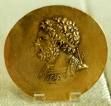
-359 Perdiccas III dies, and his younger brother Philip II of Macedon (-382 to -336) Amyntas IV, then kicks the runt out the window (executes him) and takes the crown for himself, quelling internal revolts. Roman consuls: Marcus Popillius Laenas and Gnaeus Manlius Capitolinus Imperiosus.
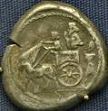
-358 Persian king (since -404) Artaxerxes II Mnemon (b. -445) dies, and his son Artaxerxes III Ochus (-425 to -338) becomes king of Persia (until -338), becoming the most bloodthirsty of all Persian rulers? The Athenians make peace with the Macedonians to leave them free to fight the Odrysae in Thrace; Macedonia gives up its claim to Amphipolis on the Macedonian coast, and Athens promises them Pydna, also on the coast; Philip II reorganizes his army along Theban lines, increasing the importance of the phalanx. Rome forces defeated Latin cities into the Latin League and renews the Foedus Cassianum of the -490s. Roman consuls: Gaius Sulpicius Peticus (dictator) and Gaius Fabius Ambustus and Gaius Plautius Proculus. Births: Macedonian king (-323 to -317) Philip III Arrhidaeus (d. -317); illegitimate son of Philip II; half-brother of Alexander III the Great. Greek (Macedonian) gen. Seleucus I Nicator (Gr. "conqueror") (d. -281) in Macedon; son of Antiochus, a gen. of Philip of Macedon. Deaths: Persian king (-404 to -358) Artaxerxes II Mnemon (b. -445).
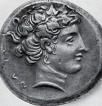
-357 Dion leads a rebellion in Syracuse that expels Dionysius II. Philip II of Macedon captures Amphipolis, but grants it independence instead of turning it over to Athens; in the winter he conquers Pydna, and keeps it; he makes a treaty against Athens with Olynthus, and marries Molossian princess (high priestess of Lesbos of the orgiastic snake-worshiping cult of Dionysus) Olympias (-375 to -316); 9 mo. later, here comes the son of god? - I'd like to climb her mountain? Chios, Rhodes, and Cos ally to overthrow their democratic govts., and together with Byzantium revolt against domineering Athens, beginning the War of the Allies (Social War) (ends -355); in midsummer the Athenian fleet under returned gen. Chabrias and new gen. Chares (known for staying in power via corruption) is decisively defeated, and Chabrias is killed in an attack on the island of Chios, after which Chares withdraws the fleet to the Hellespont to attack Byzantium. Roman consuls: Gaius Marcius Rutilus and Gnaeus Manlius Capitolinus Imperiosus.


-356 The 106th Olympiad. Roman consuls: Gaius Martius Rutilus (dictator) and Marcus Fabius Ambustus and Marcus Popillius Laenas. The first plebeian dictator rules in Rome - in short, it's the season of change? Philip of Macedon conquers Athennian ally Potidaea on the Macedonian coast. At the instigation of Thebes, the Amphictyonic Council fines Phocis for tilling land sacred to Apollo, but they refuse to pay despite a threat of war. On July 21 Greek psycho Herostratus sets fire to the Temple of Artemis in Ephesus in order to immortalize his name, after which he is executed, and any mention of his name forbidden under penalty of death, which doesn't stop historian Theopompus from immortalizing him in his Hellenics anyway, causing the expression "pursue a Herostratic honor" to be coined, along with the Streisand Effect; the temple takes 120 years to rebuild; Alexander III the Great (d. -323) is allegedly burn, er, bairn, er, born the same day. Architecture: The Artemision (Temple of Artemis) NE of Ephesus (near modern-day Selcuk, Turkey) is destroyed by fire, after which it is rebuilt by Macedonian architect Deinocrates (Dinocrates) (Dimocrates) (Cheirocrates) (Stasicrates) of Rhodes, becoming one of Pausanias' Seven Wonders of the World in his 10-vol. History of Greece (162 B.C.E.) (4.31.8; 7.5.4); the others are the pyramids at Giza, Egypt (only one to survive to modern times), the Hanging Gardens of Babylon, the Statue of Zeus in Olympia, Greece, the Mausoleum of Halicarnassus in Bodrum, Turkey, the Pharos Lighthouse in Alexandria, Egypt, and the Colossus of Rhodes in Rhodes, Greece; the Artemision becomes a famous place of sanctuary (Acts 19:23-41); the temple is destroyed in 263 C.E. after only 93 years. Births: Macedonian king (-336 to -323) and undefeated gen. (epileptic) (gay) ("the Madman of Macedonia") ("Conqueror of the World") Alexander (Gr. "defender of men") III the Great (d. -323) on July 20/21 (night) in Pella; son of Philip II (-382 to -336) and 5th wife Olympias (-376 to -316). Macedonian gen. (gay) (19-year lover of Alexander III) Hephaistion (Hephaestion) (d. -324). Deaths: Greek philosopher Aristippus of Cyrene (b. -435) in Cyrene, Libya; his daughter Arete of Cyrene takes over his Cyrenaic school.
-355 Faced by a series of revolts, Athens caves-in to the Persians and withdraws from Asia Minor, recognizing the independence of its allies there, and gives up its confederation, replacing the war party of Chares and Aristophon with a peace party under Eubulus; Isocrates is elected ruler of Athens; the theoric fund is founded for financial surpluses, to be used for public entertainment - is that like "I, Isocrates"? The Phocians, led by Philomelus seize Delphi, beginning the 10-year Third Sacred War (ends -346) with the Amphictyons, and allies with Athens and Sparta, using the sacred money from Delphi to pay for a large mercenary army. Philip II of Macedon takes the city of Crenides (Krenides) in E Macedonia (N Greece) from Thracian Odrysae and renames it Philippi, planning on making it a great city; gold coins made from the gold mines in the area are issued in his name. Roman consuls: Gaius Sulpicius Peticus and Marcus Valerius Poplicola. Births: Greek Macedonian gen. Peithon (Pithon) (d. -314). Greek Macedonian princess Cleopatra of Macedon (Epirus) (d. -308); daughter of Philip II of Macedon and Olympias of Epirus; sister-wife of Alexander III the Great; sister of Thessalonike and Cynane; half-sister of Philip III of Macedon. Greek Macedonian gen. Lysimachus (d. -281); Thessalian gen. of Alexander the Great, and ruler of Thrace from -323 to -281. Deaths: Greek astronomer-mathematician Eudoxus of Cnidus (b. -408).
-354 In the summer Philip II of Macedon captures Methone (Methoni) in Pieria after a long siege, during which he takes an arrow in the right eye from a sniper while inspecting siege machinery, but luckily his helmet deflects its trajectory, and Greek physician Critobulus of Cos uses the Spoon of Diokles to extract the arrowhead, saving his life although he loses the eye; he then advances into Thessaly. The Phocian mercenary army is defeated by the Boeotians at the Battle of Neon (Crocus Field) near the Gulf of Paghasitikos, and Philomelus is KIA; Onomarchus (d. -352) becomes the ruler of funky, funky, funky Phocis. After Calippus of Athens tricks Dion into thinking he's not in the conspiracy by feeding him rumors of one and swearing he's not in it at the Temple of Persephone on the day it is done, Dion of Syracuse (b. -408) is assassinated by unarmed Zacynthians who jump him and try to strangle him but fail, after which Lyco of Syracuse gives them a sword to finish him off; Calippus becomes tyrant of Syracuse for 13 mo. (until -352). Roman consuls: Marcus Fabius Ambustus and Titus Quinctius Poenus Capitolinus Crispinus. Births: Bithynian king #1 (-326 to -278) Zipoites (Zipoetes) (Ziboetes) I (d. -278); son of Bas (-397 to -326); father of Nicomedes I (-300 to -255). Deaths: Greek historian Xenophon (b. -431); leaves Agesilaus, and other works, incl. Cyropedia (Education of Cyrus), the prototype of the novel. Syracuse tyrant Dion (b. -408) (assassinated).
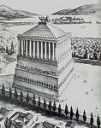
-353 The Phocians led by Onomarchus seize Thermopylae and Orchomenos, and defeat Philip II of Macedonia 2x. Roman consuls: Titus Manlius Imperiosus Torquatus (dictator) and Gaius Sulpicius Peticus and Marcus Valerius Poplicola. Deaths: King (since -377) Mausollos (Mausolus) of Caria; dies after annexing Rhodes and Cos; for his tomb his sister-wife Queen Artemisia builds the first Mausoleum (Tomb of Mausolus) in Halicarnassus (modern-day Bodrum or Budrum, Turkey) (finished -350).
-352 The 107th Olympiad. Philip II of Macedon defeats and kills Onomarchus, unites Thessaly under his rule, then marches S toward Greece, but is stopped at Thermopylae by the Phocians allied with the Athenians, Achaeans, and Spartans. After an unsuccessful attempt to conquer Messina, followed by a successful campaign against Rhegium, Calippus of Syracuse is KIA by his mercenaries Leptines II and Polyperchon with the same sword he used to kill Dion; Dion's brothers Hipparinus and Aretaeus (sons of Dionysius I) succeed as tyrants of Syracuse, attempting to stabilize Sicily. Roman consuls: Gaius Julius Iullus (dictator) and Publius Valerius Poplicola and Gaius Marcius Rutilius.
-351 The first plebeian censor in Rome is appointed. Persia attacks Egypt but fails. Sidon is burned by its inhabitants, and 40K are killed. Olynthus becomes suspicious of Philip II's designs and appeals to Athens for aid, and Demosthenes, leader of the anti-Philip party gives his three Olynthiac Orations, urging action against the Macedonian menace. Cyprus revolts against Persian rule (until -349), and Athenian gen. Phocion aids Persian emperor Artaxerxes III in subduing them. Roman consuls: Marcus Fabius Ambustus and Gaius Sulpicius Peticus and Titus Quinctius Poenus Capitolinus Crispinus.
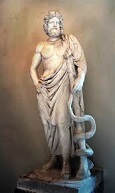
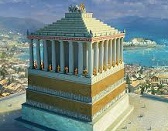
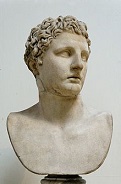
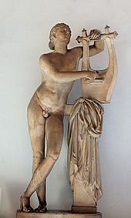
-350 Roman consuls: Lucius Furius Camillus (dictator) and Marcus Popillius Laenas and Lucius Cornelius Scipio. Tennes leads a revolt against the Persians in the Phoenician martime city of Sidon, which is crushed by Artaxerxes III with mucho killing; Artaxerxes III, assisted by Holophernes, brother of Ariarathes I of Cappadocia recovers Egypt. Neoptolemus I dies, and his son Alexander I of Epirus (-370 to -331) (brother of Olympias, and uncle of Alexander III the Great) becomes king of Epirus. becomes king of Epirus. Yadi'ubil Bayyin (d. -335) becomes king of Saba (until -335). About this time Pergamum (Pergamon) (Pergamos) in Asia Minor, whose acropolis atop a 1300-ft. cliff above the Calcus River gives it an excellent view of the Bay of Lesbos becomes known for its worship of Asclepius (Asclepios) (Asklepios), the god of medicine and healing (son of Apollo), known for his snake-entwined (no wings like Hermes' Caduceus) Rod of Asclepius that becomes a symbol of medicine; his daughters are Hygieia (cleanliness), Isaso (recuperation), Aceso (healing process), Aglaea (Aegle) (beauty), and Panacea (universal remedy); Epidaurus (Epidoros), his alleged birthplace becomes the #1 healing center of the ancient Greek-Roman world, lasting until the mid-5th cent. C.E. as a Christian healing center - the first free clinic for the treatment of sexually-transmitted disease? Chinese emperor Zhou Xian Wang makes Xiangyang in Hubei Province his capital, and institutes an agricultural tax. Shang Yang becomes PM of Qin under Duke Xiao, going on to standardize weights and measures, and build the Shang Yang Canal. About this time the nice seaport of Nice (Nikaia) (Gr. "victory") is founded on the Mediterranean coast by the Greeks of Massilia (Marseille) after a big V over the neighboring Ligurians, and it soon becomes one of the busiest trading ports on the Ligurian Coast, while engaging in rivalry with the nearby Roman town of Cemeneleum on nearby Cimiez Hill. By this time all of S Etruria is being kept in check by Roman garrisons and denationalized by an influx of Roman colonists. About this time Greek painter Antiphilus flourishes, working for Philip II of Macedon and Ptolemy I of Egypt, becoming a rival of Apelles. Architecture: The Mausoleum at Halicarnassus is completed as the tomb of King Mausollos of Caria by sculptors Leochares, Praxiteles, Scopas et al. Art: About this time the 7.3' nude dangly Apollo Belvedere statue is sculpted of white marble by Greek sculptor Leochares, showing Apollo after having shot an arrow; a Roman copy is made about 130 C.E., which is discovered in 1489 in Anzio, Italy, and ends up in the hands of Pope Julius II (Giuliano della Rovere); in 1755 German art historian Johann Joachim Wincklemann calls it the best example of the Greek aesthetic ideal, after which it becomes an icon of the Enlightenment; in 1796 Napoleon steals it from the Vatican, which gets it back in 1815 after his fall; about 325 B.C.E. Leochares also sculpts Diana of Versailles (Diana Chasseresse) (Artemis, Goddess of the Hunt), which is is given in 1556 by Pope Paul VI to Henry II of France, who places it in his Jardin de la Reine in Fontainebleau, after which in 1602 Henri IV moves it to the Louvre, after which in 1710 Louis XIV moves it to Versailles; a miniature replica stands on the fireplace mantle in the first class lounge aboard the Titanic when it sinks; Leochares also sculpts ivory-gold statues of Philip II of Macedon, Alexander III the Great, Olympias, Amyntas III, and Eurydice I, exhibited in the Philippeion in the Altis of Olympia, built by Philip II to celebrate his V at the Battle of Chaeronea in -338. Nonfiction: About this time Greek writer Aeneas Tacitus writes How to Survive Under Siege, a treatise on siegecraft, describing arrow-shooting machines; he also invents a coded optical communication system using torches and water jars. Births: Indian PM ("the Indian Machiavelli") Chanakya (d. -283). Athenian Peripatetic orator Demetrius Phalereus (d. -280) in Phalerum; pupil of Theophrastus. Deaths: Greek sculptor Scopas (b. -395); leaves Bust of Meleager, Statue of Pothos (Desire) (which is much copied with different props), Statue of Aphrodite (copper), Bust of Hygieia (daughter of Asclepius). Greek Athenian orator-gen. Callistratus of Aphidnae (b. ?) in Athens (executed).
-349 The revolt in Cyprus (begun -351) is quashed. Athens allies with Olynthus; meanwhile Philip II of Macedon begins capturing all the towns of Chalcidice, invading Euboea and setting up local tyrants who incite the local pop. to revolt from the Athenian League, causing the Athenians under Phocion to go against Demosthenes' advice and divide their forces between Euboea and Olynthus; hoping to win the Euboeans by diplomacy, Phocion establishes a camp near Tamynae, telling his men to ignore turncoats taking Macedonian bribes; Demosthenes unsuccessfully attempts to divert money from the Athenian theoric fund for the military. Long-lived Roman hero Marcus Valerius Corvus (-370 to -270) defeats a giant Gallic champion in single combat, helped by a crow (giving him his cognomen), ending the Fourth Roman-Gallic War (begun ?) - the second Roman Rocky? Roman consuls: Titus Manlius Imperiosus Torquatus (dictator) and Lucius Furius Camillus and Appius Claudius Crassus Inregillensis.
-348 The 108th Olympiad. Carthage signs a second treaty with Rome (first in -508). Athenian comdr. Phocian defeats a Euboean army under gen. Callias of Chalcis, almost losing when he decides to offer too many religious sacrifices before battle, allowing the Euboeans to attack first, then freeing the POWs for fear that his fellow Athenians would be too harsh with them before returning to Athens; meanwhile Philip II of Macedon takes Olynthus, destroys it and enslaves its pop., then makes peace with the Thracians. Roman consuls: Gaius Claudius Crassinus Regillensis (dictator) and Marcus Valerius Corvus and Marcus Popillius Laenas.
-347 The Thebans and Thessalians call on Philip II of Macedon to intervene on behalf of the Amphictyonic League and fight the Phocians in the Sacred War. Tyrant Dionysius II returns to Syracuse (until -345). Plato (b. -427) dies, and his nephew Speusippus (-407 to -339) succeeds him as head of the Academy in Athens, going on to reduce the Good from the #1 to #2 principle, and argue that one cannot know something until one knows all the differences which separates it from everything else, inventing the ideas of genera and species, and dividing philosophy into Dialectics, Ethics, and Physics. Roman consuls: Gaius Plautius Venno and Titus Manlius Imperiosus Torquatus. Deaths: Greek "number appears to lead towards truth" philosopher Plato (b. -427) in Athens at age 76-80; "I am the wisest man alive, for I know one thing, and that is that I know nothing"; "One of the penalties for refusing to participate in politics is that you end up being governed by your inferiors"; "Whatever deceives seems to exercise a kind of magical enchantment"; "Wonder is the feeling of the philosopher, and philosophy begins in wonder"; leaves The Dialogues, incl. nine tetralogies (arrangement ascribed to Tiberius' court astrologer Thrasyllus by Diogenes Laertius): 1: Euthyphro (attempt to define the meaning of piety to defend against the charge of impiety), Apology, Crito, Phaedo (which describes Socrates' last words and hemlock death, and claims that swans sing because they are inspired by Apollo, and is also claimed to have the beginning of the Gospel of John and the Trinity in it by St. Augustine); 2: Cratylus, Theaetetus, Sophist, Statesman; 3: Parmenides, Philebus, Symposium, Phaedrus; 4: Alcibiades 1 & 2, Hipparchus, Lovers; 5: Theages, Charmides (Temperance), Laches, Lysis; 6: Euthydemus, Protagoras, Gorgias, Meno; 7: Hippias Major, Hippias Minor, Ion ("Poetry is nearer to vital truth than history"), Menexenus; 8: Clitophon, The Republic, Timaeus ("God created the soul before the body and gave it precedence both in time and value, making it the dominating and controlling partner"), Critias; the Story of Atlantis is found in "Timaeus" and "Critias", allegedly passed down by his ancestor Solon; 9: Minos, Laws; Epinomis, Letters; spurious works incl. Axiochus, Definitions, Demodocus, Epigrams, Eryxias, Halcyon, On Justice, On Virtue, Sisyphus.
-346 After Philip II of Macedon marches into Phocis and destroys its cities, the Third Sacred War (begun -355) ends with disaster for the Phocians, who are kicked out of the Amphictyonic Council, ordered to pay a huge fine, and dispersed into small villages; Philocrates (Philokrates) is elected ruler of Athens, negotiating the Peace of Philocrates with Philip II along with Aeschines, Demosthenes, and seven other Athenian ambassadors, leaving the status quo; after the ambassadors are dealayed on their way back from Athens with approval of the assembly, Philip uses the opportunity to conquer more of Thrace; Philip II hosts the Pythian Games at Delphi with the Thebans and Thessalians, causing Panhellenic groupies to begin hailing him as the destined messiah who will lead them against common enemy Peria. Tyrant Dionysius II returns to rule Syracuse. Roman consuls: Marcus Valerius Corvus and Gaius Poetelius Libo Visolus.

-345 Dionysius II is replaced as tyrant of Syracuse by Hicetas, tyrant of Leontini. Mahapadma Nanda (-400 to -329) ("Destroyer of all the Kshatriyas") usurps the throne of Maghada in N India from Shishunaga, and founds the Nanda Dynasty (ends -321), which becomes known for its great wealth, building a 200K-man infantry with 20K-80K cavalry, 2K-8K war chariots, and 3K-6K war elephants, extending his rule from Bengal to Punjab, and S to the Vindhya Range and the Deccan Plateau, becoming the first great empire of N India. Roman consuls: Lucius Furius Camillus (dictator) and Marcus Fabius Dorsuo and Servius Sulpicius Camerinus Rufus. Births: Greek philosopher Menedemus of Eretria (d. -260) in Eretria; pupil of Stilpo and Phaedo of Elis. Green historian Timaeus (d. -250) in Tauromenium (modern-say Taormina), Sicily.
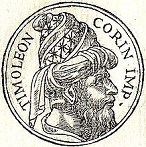
-344 The 109th Olympiad. Hicetas is ousted by Greek gen. Timoleon of Corinth (-411 to -337) at the request of the people of Syracuse, and exiled to Corinth; Timoleon institutes a moderate oligarchy complete with a dem. constitution that makes him military CIC, the priest of Zeus (amphipolos) as chief magistrate, and 600 wealthy citizens as the council; he then begins a campaign to oust other tyrants in Sicily and S Italy, causing Greek Sicily to revive its economy and culture. Philip II of Macedon begins a campaign to secure a foothold in the Peloponnesus, espousing the cause of the Argives, Messenians et al. against the Spartans; Demosthenes travels through the Peloponnesus trying to develop an anti-Macedonian alliance, delivering his Second Philippic at Athens. Roman consuls: Publius Valerius Poplicola (dictator) and Gaius Marcius Rutilus and Titus Manlius Imperiosus Torquatus.
-343 Persian king (since -358) Artaxerxes III Ochus (-425 to -338) reduces Sidon, conquers Egypt, and becomes the first (only) ruler of the Egyptian Thirty-First (31st) (XXXI) Dynasty (ends -332); 60 years of independence for Egypt ends, along with the New Kingdom - but the Isis-Osiris-Horus show goes on tour and breaks box office records? The First Samnite War (ends -341), the first of three Roman wars with the Samnites in S Italy begins when the Oscan Campanians ask for Roman aid against the Samnites - of course it's awful but it's a job? Roman consuls: Marcus Valerius Corvus and Aulus Cornelius Cossus Arvina. Deaths: Greek tyrant Dionysius II of Syracuse in Corinth (exile).
-342 Roman consuls: Marcus Valerius Corvus (dictator) and Quintus Servilius Ahala and Gaius Marcius Rutilus. Philip II of Macedon conquers Eumolpias (modern-day Plovdiv) in Thrace, and renames it Philippopolis; the Romans later rename it Trimontium ("City of Three Hills"), and make it the capital of Thrace. Alexander I Molossus (-370 to -330) (brother of Alexander III the Great's mother Olympias) becomes Aeacid king of Epirus (E coast of the Ionian Sea in modern-day S Albania and NW Greece). The Latin Revolt (ends -338) begins when the Lucanians invade Tarentum from C Italy, causing the latter to call on Sparta for help, and they send Archidamus III with an army and fleet. Inventions: The crossbow is used in the Battle of Ma-Ling in Henan Province, China. Births: Athenian comic dramatist Menander (d. -291); master of the Greek New Comedy; rival of Philemon.
-341 The Persians complete the conquest of Egypt. The Carthaginians under Hasdrubal and Hamilcar try to conquer Sicily but are defeated by Syracuse under Timoleon at the Battle of the Crimissus. Demosthenes gets Athens to form an anti-Macedonian alliance with Euboea and the Pelopennesus, and they send an army under gen. Chares to protect the Greek colonies of Chersonensus, Perinthus, and Byzantium from pesky Philip II, but they tell him to fuck off and almost cancel the expedition until Phocion talks them out of it. The First Samnite War (begun -343) ends in a draw after minor Roman Vs. Roman consuls: Gaius Plautius Venno and Lucius Aemilius Mamercinus Privernas. Births: Greek Epicurian philosopher (vegetarian) Epicurus (Gr. "ally/comrade") (d. -270) in Feb. in Samos.
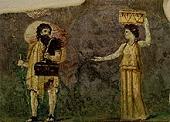
-340 The 110th Olympiad. Demosthenes is elected ruler of Athens. The Great (Second) Latin War (ends -338) begins when Latin and Volscian cities revolt against Roman domination of the Latin League; Roman consul Publius Decius Mus does a devotio, sacrificing himself to the gods in battle to guarantee a V in the Latin War - I Mus do it, I Mus? Philip II of Macedon sieges Perinth in Thrace, employing arrow-firing machines; meanwhile his 16-y.-o. son Alexander III rules Macedonia in his absence, puts down the rebellious Maedi in W Thrace, takes their chief city by storm, drives out its pop. and brings in his own settlers, and names the place Alexandropolis Maedica in honor of himself. The Romans begin settling Campania, displacing the Oscans and the Greeks (in Neapolis or Naples and Cumae), and founding or enlarging the towns of Capua, Puteoli, Nola, Pompeii, Hercules-worshipping Herculaneum, Nuceria, Teanum, Venafrum (known for fine olives) and Salernum; the coast becomes a favorite resort for wealthy Romans, who build villas at Misenum, Pompeii, Herculaneum, Puteoli, Baiae et al. About this time after being born rich and giving it away, lame hunchbacked Cynic philosopher Crates of Thebes (-365 to -285) moves to Athens, becoming the pupil of Diogenes of Sinope followed by the teacher of Zeno of Citium, marrying babe Hipparchia of Maroneia, sister of his student Metrocles, who gives up her wealth for him; he becomes known as the Door-Opener from his habit of entering any house he pleased, being welcomed with honor and gladness. About this time the city of Tianjin (Tientsin) (Chin. "ford of Heaven") on the Bohai Gulf of the Yellow Sea on the N coast of China (modern-day pop. 12.7M/15.4M) is settled, becoming China's largest coastal city. Roman consuls: Lucius Papirius Crassus (dictator) and Titus Manlius Imperiosus Torquatus and Publius Decius Mus. Births: Roman patrician politician Appius Claudius Caecus (gr. "the blind") (d. -273). Egyptian Ptolemaic queen #2 Berenice (Gr. "bearer of victory") I (d. -271); consort and half-sister of Ptolemy I.


-339 After the Athenians send gen. Phocion to aid Byzantium, and he earns their trust via his personal friend Leon, Philip II of Macedon sneak-attacks the city at night, but his army is spotted due to a bright crescent moon, causing the city dedicated to Diana, goddess of the hunt to adopt the crescent moon as its symbol; Phocon counterattacks and drives the Macedonians out of the region, but is wounded and returns to Athens; meanwhile the Megarians secretly request military help, causing him to arrive with his army and erect two long walls to the seaport of Nisaea, causing them to feel so safe that they ally with Athens. To prevent the Sicilian tyrants from allying with Carthage, Timoleon makes a separate peace with Carthage, establishing a boundary at the Halycus River, then expels the tyrants and forms a military league against Carthage; Timoleon then retires from public life. Philip II of Macedonia attempts to convince the Amphictyonic Council to fine Athens for improperly dedicating spoils from Persia and Thebes, but orator Aeschines (-389 to -314) gives a great speech that diverts attention to the Locrians of Amphissa, causing the Fourth Sacred War between the Macedonians and the Locrians to begin (ends -338); the Amphictyonic Council gives Philip II of Macedon command of the League's forces, causing the Athenians to enter an anti-Macedonian alliance with Thebes, and send a force of 10K mercenaries to guard Amphissa. Demosthenes reforms the financial system supporting the Athenian navy. Chalcedon-born Xenocrates (-396 to -314) becomes head (scholarch) of the Platonic Academy in Athens (until -314), backing Plato's teaching but claiming a third form of being other than the sensible and intelligible, corresponding to opinion; he splits with Plato by considering Platonic ideas to be identical with mathematical objects, and considers unity and duality to be gods that rule the Universe, and the soul to be a self-moving number; he believes in daemonical powers intermediate between the divine and moral, which consist of conditions of the soul; he teaches that virtue produces happiness, but that worldly goods can help. Roman consuls: Quintus Publilius Philo (dictator) and Tiberius Aemilius Mamercinus. Deaths: Greek philosopher Speusippus (b. -407) in Athens.
-338 In the summer Persian-Egyptian King Artaxerxes III Ochus is murdered along with all his sons except the youngest by his own cmdr., the eunuch Bagoas, and he is succeeded by Artaxerxes III's youngest son Artaxerxes IV Arses (d. -336), whose reign sows the seeds for Persia's ultimate downfall? On Aug. 2 after annihilating Athens' mercenary force and capturing Amphissa (Amfissa) (Salona) between Mt. Giona and Mt. Parnassus in Phocis 120 mi. NW of Athens, Philip II of Macedon and his son Alexander III the Great crush Athens and Thebes in their struggle for independence at the Battle of Chaeronea in Boeotia, at which the Sacred Band of Thebes of 300 paired gay warriors goes down (but not on each other any more?); the era of Greek independence is kaput, and Philip II is master of Greece; Alexander burns all of Thebes except the house of poet Pindar, and garrisons Thebes while letting Athens go free; the Fourth Sacred War (begun -339) ends; Greece loses its independence until 1820 C.E.; Philip II declares the League of Corinth to unite the Greeks in a war against Persia, causing all Greek states except Sparta to join under Macedonian hegemony but with members guaranteed autonomy, with only Thebes, Corinth, Chalcis, and Ambracia garrisoned; the Achaean League joins the opposition to Philip II and is dissolved; Macedonia replaces Thebes as the leading Greek state (hegemon); Athens elects Gen. Phocion (who was touring the Aegean colonies) during the Battle of Cheronea) as strategos for the first of 45x, going on to try unsuccessfully to stop Athens from joining the Hellenic League. Archidamus III of Sparta invades S Italy, which ends in defeat and his death, and his son Agis III (d. -331) becomes Eurypontid king #21 of Sparta (until -331). Ctesiphon is elected ruler of Athens. The Latin Revolt (begun -342) ends after Sparta is defeated and Archidamus III is KIA at the Battle of Manduria (in modern-day Taranto). The Great Latin War (begun -340) ends with a Roman V at the Battle of Trifanum; the Latin League is dissolved, and Rome now dictates Latin foreign policy; most of the conquered Italic states have their land confiscated to become ager publicus, and are reduced to the status of civitates federatae (allied states), forced to contribute soldiers to Rome; old Latin states such as Tibur (Tivoli) (20 mi. from Rome at the confluence of the Sabie and Aniene Rivers) and Praeneste retain autonomous govts. with the right of ius migrationis (becoming Roman citizens if they move to Rome); their remaining enemies form a last ditch anti-Roman coalition, which incl. the Etruscans, Umbrians and Gauls in the N and the Lucanians, Bruttians and Samnites in the S (ends -280). Roman consuls: Lucius Furius Camillus and Gaius Maenius.
-337 The Second Congress of Corinth (first in -481) declares a Common Peace. In 337 B.C.E. Philip II reorganizes the conquered Greek territories in the Corinthian League; Alexander III the Great repudiates his wife Olympias, who goes into exile in the Molossian court of Alexander I of Epirus and plots against him with hatey hate hate hate, trying to talk him into making war on Philip II, which he doesn't buy, instead marrying Philip II's daughter (his niece) Cleopatra of Macedon (-355 to -308) next year (put up to it by Olympias?). The first plebeian praetor in Rome is elected, and the praetorship is made the stepping stone to the consulate. Roman consuls: Gaius Claudius Crassinus Regillensis (dictator) and Gaius Sulpicius Longus and Publius Aelius Paetus. Deaths: Greek statesman-gen. Timoleon (b. -411) in Syracuse, Sicily; dies blind, and is buried at the expense of the citizens, who build a monument and gymnasium called the Timoleonteum.

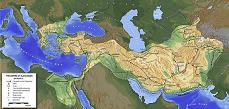

-336 The 111th Olympiad. In the spring Persian king Arses is murdered by Bagoas, and Darius III Codomannus (d. -330) kills him and becomes king of Persia, and the last ruler of the 31st Egyptian Dynasty; he is a cousin of Artaxerxes III, whom the eunuch Bagoas murdered, and was raised by the eunuch Bagoas, whom he in turn murders. A proven 40 is traded for an unproven 20? In the summer after sending a 10K-man army under gen. Parmenio (-400 to -330) to Asia Minor, 46-y.-o. Macedonian King Philip II (b. -382) is assassinated by a disgruntled bodyguard during the wedding of Olympias' daughter Cleopatra to her brother Alexander I of Epirus, and his 20-y.-o. son Alexander III the Great (-356 to -323) succeeds; Greek historian Diodorus later attributes the assassination to the Fates, but attributes Alexander's er, reat success to "his own force of character"; although his daddy left 60 talents in the treasury, he owed 500, leaving Alexander a net of only a few gold and silver cups; driven by a boundless desire for glory, he borrows 800 talents, forms a comparatively small but good army, and sets out looking to conquer you guessed what, invading Illyria and Thrace; meanwhile Philip's lavish tomb at Vergina 75km SW of Thessaloniki, filled with a gold sarcophagus and gobs of exquisite gold doodads and prepared years in advance is sealed, and rediscovered in 1978 beneath a host of other tombs that had been ransacked by robbers; it contains a carved ivory hunting scene, incl. a cool tiny Bust of Alexander, which breaks with tradition and shows a lifelike depiction, becoming the first political portrait?; Alexander goes on to have many statues made depicting his charismatic blonde big-hair Caucasian face with straight aquiline nose, which ends up on coins for centuries, being used by future rulers to give credibility to their regimes? Demosthenes is elected ruler of Athens; gen. Phocion bans all celebratory sacrifice for Philip II, with the soundbyte "It isn't worthy enough that the army that defeated us at Cheronea has lost just one of its soldiers". The rulership of Timoleon in Syracuse gives way to a democracy (ends -317). Roman consuls: Lucius Papirius Crassus and Kaeso Duillius.
Minus 335, Aristotle begins his jive?

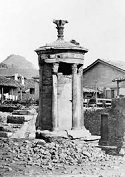
-335 Roman consuls: Lucius Aemilius Mamercinus Privernas (dictator) and Marcus Atilius Regulus Calenus and Marcus Valerius Corvus. A rumor that Alexander III the Great had died on campaign causes Thebes, Athens, Arcadia, Elis, and Aetolia to revolt against the Macedonians, and Alexander rushes S, captures and destroys Thebes (except for a statue of poet Pindar) and enslaves its pop., and defeats the rebellion in Illyricum; when Alexander refuses to see the Athenian ambassadors, Phocion is sent, and when Alexander asks his advice out of respect to his father, he tells him to quit oppressing Greece and go after Persia, which advice Alexander takes, making Phocion one of his favorites ahead of a lot of Macedonians, packing his lunch basket for his great campaign to kick Persian butt; meanwhile the-cat's-away Olympias orders the murder of Philip II's other wife Cleopatra. After breaking ranks with his master Plato of the Academy in Athens, Aristotle (Gr. "best (purpose) of all") of Stagira (-384 to -322) begins his career by founding a gymnasium in E Athens called the Lyceum (Lykeion), named after a nearby temple to Apollo Lycean (Gr. "lukos" = wolf), founding the Peripatetic School, named either after the collonades of the Lyceum, or for his habit of walking and talking; he prefers to go around collecting data before solving problems, vs. Platonists, who sit around thinking up answers by pure thought; Aristotle writes the 10-vol. Nicomachean Ethics, which becomes a hit during the European Middle Ages, and uses lunar eclipses to prove that the Earth is ball-shaped. About this time Greek Peripatetic philosopher-musician Aristoxenus of Tarentum (b. -375) (pupil of Aristotle) flourishes, leaving Elements of Harmony, becoming the main modern source of knowledge about ancient Greek music. Architecture: The Choragic Monument of Lysicrates in Athens is begun (finished in -334), becoming the oldest known building of the Corinthian Order, allegedly invented by Callimachus after he visited the tomb of a virgin whose nurse placed a tile on a basket of valuables on the root of an acanthus plant, which grew around it, forming volutes at the extremities. Births: Green physician (the first anatomist) (co-founder of the Medical School of Alexandria) Herophilus (Herophilos) (d. -280) in Chalcedon; lives in Alexandria. Greek Peripatetic philosopher (dir. #3 of the Lyceum) Strato of Lampsacus (d. -269); son of Arcesilaus of Lampsacus; tutor of Ptolemy Philadelphus and Aristarchus of Samos; denies the need for a God to create the Universe.


-334 In May Alexander III the Great launches his campaign against Persia, leaving his gen. Antipater (-397 to -319) as gov. of Greece and worshipping at Dion at the foot of Mt. Olympus, then crossing the Hellespont with an army of 32K infantry and 5K cavalry, and a 160-ship navy of Greek allies; his approach causes most Greek cities of Ionia to revolt against their Persian masters; in June after Persian naval cmdr. (of Greek forces in Persian service) Memnon of Rhodes unsuccessfully advises a tactical retreat, Alexander totally defeats the Persian army of Darius in the NW corner of Asia Minor in the Battle of the Granicus River (which flows from Mount Ida to the W shore of the Sea of Marmara near Priapos, and is named for river god Granicus or Grenikos), then conquers Lydia (incl. Sardis) and liberates the Persian bases of Miletus and Helicarnassus, cutting off access to food and water to the Persian fleet under Memnon of Rhodes (-380 to -333), which flees, alowing Alexander to capture the rest of the ports on the Anatolian coast; Ephesus breaks away from the Persians and comes under control of a series of Hellenistic rulers. King (-350 to -331) Alexander I Molossus of Epirus (-370 to -331) (brother of Olympias, and uncle of Alexander III the Great) is called in by the Greek colony of Taras (Tarentum) in Magna Graecia in S Italy to fight the Italiote League of the Oscan-speaking Lucanians (Lucani) and the Bruttii, setting a precedent for Epirus to interfere in their affairs. Su Qin persuades six kingdoms to fight the Qin (Ch'in) kingdom. Roman consuls: Publius Cornelius Rufinus (dictator) and Spurius Postumius Albinus and Titus Veturius Calvinus. Architecture: The grand Temple of Apollo in Didyma in modern-day Turkey is begun; it is never finished, and construction ends in 300 C.E.; an earthquake damages it in the 16th cent.; in Oct. 1979 Lothar Haselberger of the Tech. U. of Munich discovers nearly complete plans for it inscribed in stone on some of its walls. Births: Greek philosopher (founder of Stoicism) Zeno of Citium (d. -262) in Citium, Cyprus; pupil of Crates of Thebes (-365 to -285).


-333 In the spring Memnon of Rhodes dies during the siege of Mytilene, causing Darius III to withdraw his Greek mercenaries into Syria and gather a large army. Alexander III the Great subdues Ancyra (modern-day Ankara), Caria, and Cilicia, then advances into Syria; in Nov. he defeats Darius III in the SE corner of Asia Minor at the Battle of Issus, a seaport on a narrow coastal strip between high mountains and the Gulf of Issis in Cilica (near modern-day Alexandretta, Syria), causing Darius to offer him 10K talents plus all of Asia W of the Euphrates if he backs off, but Alexander demands unconditional surrender, which he obtains from Damascus; Alexander takes Memnon of Rhodes' widow Barsine (-363 to -309) as his mistress, becoming the only woman he has sex with until his marriage to Roxane in -327 (how many men, though, who knows - at least he doesn't have to make the Macedonian bar scene anymore?); Alexander III the Great makes Antigonus I (Cyclops) (Monophthalmus) (-382 to -301) gov. of Phrygia in W Asia Minor; Phoenicia, incl. Sidon, Arwad, and Byblos is conquered, except for hard-to-crack Tyre, causing Alexander to begin a 7-mo. siege (ends (-332); meanwhile after Rhodes allies with Ptolemy, he sends his son Demetrius I Poliorcetes ("besieger of cities") (-337 to -283) to invade it with 40K men, and after he finds its walls impregnable he sieges it (until -304), building massive siege towers, the first ship-borne tower capsizing in a storm, and the larger land-based Helepolis stopped by flooding the land in front of the walls. The Qin defeat the Wei. Roman consuls: Publius Cornelius Ruffinus (dictator).

-332 The 112th Olympiad. In Jan. blonde-blue Macedonian king (since -336) Alexander III the Great (-356 to -323) sieges the well-protected island city of Tyre under its last king Azemilkos, and captures it in Aug. after a 7-mo. siege by building an enormous mole connecting it permanently with the mainland, during which time he goes underwater in a diving bell to observe divers removing underwater obstacles, and has his vessels equipped with chain cables so that they couldn't be cut adrift at night; he crucifies 2K POWs and sells 30K more into slavery; the Persian navy disintegrates, and Phoenician trade slackens as the Phoenicians lose their identity and are Grecianized; Alexander then obtains the submission of the provinces of Galilee, Samaria and Judah, and invades Egypt, and Persian satrap Mazaces surrenders without a fight, ending the 31st Egyptian Dynasty (begun -343); Alexander stay in Egypt for a year, visiting the Egyptian coast and ordering the Temple of Luxor restored to its ancient glory, then having an overwhelming desire to found a new city (according to Roman author Arrian), which becomes Alexandria (modern-day pop. 5M), then visits the Oracle of Amon-Ra at the Siwah Oasis in the Western Desert (barely making it and almost dying of thirst), where is proclaimed the son of god; the Late Period of Ancient Egypt (begun -664) ends; there were settlements in the Alexandria area for several hundred years?; Rhodes voluntary recognizes Alexander the Great's sovereignty (until -323); Alexander III the Great's uncle Alexander I of Epirus crosses the Adriatic Sea to Italy to assist the Tarentines against the Lucanians, Bruttians, and Samnites, and wins a V over the Samnites and Lucanians near Paestum, making an arrangement with the Romans for a joint attack on the Samnites, taking Heraclea from the Lucaanians, and Terina and Sipontum from the Bruttii, causing the Tarentines to fear that he's trying to set up a kingdom in Italy and turn against him. According to Jewish historian Josephus in his Antiquities 11.317-45, Alexander III the Great visits Jerusalem, and the Jewish elders freak him by reading to him from the Book of Daniel (Ch. 2) the prophesy about the statue with a head made of gold, chest and arms made of silver, belly of brass, legs of iron, and feet of iron mixed with clay, explaining that the head is Babylon, the breast and arms Medo-Persia, the brass belly and thighs Greece, and the iron legs Rome, before or after which he has a dream about the Jewish god being right and sacrifies to him, sparing the city from sacking although putting it under his control; they probably didn't read to him from Ch. 8, which talks about the shaggy goat with one large horn between its eyes that is replaced by four horns that have lesser power?; too bad, the pop. of Gaza puts up a fight at a stronghold on a hill, causing Alexander to siege and take it in Oct. after suffering a serious shoulder wound, massacring the men and selling the women and children into slavery; meanwhile after cooperating with Alexander (who thinks Jerusalem is a no-value town run by stargazers?), the Samaritans build their Samaritan Temple to Jehovah on Mount Gerizim. Roman consuls: Marcus Papirius Crassus (dictator) and Gnaeus Domitius Calvinus and Aulus Cornelius Cossus Arvina.

-331 On Apr. 7 the city of Alexandria on the Cape Lochias Peninsula, protected by the island of Pharos is founded by Alexander III the Great, with Cleomenes of Naucratis (d. -322) as gov. #1; a number of Jews settle there immediately - and begin churning out the New Testament? In the spring Alexander III the Great leaves Egypt and marches for Mesopotamia, quelling a rebellion by the Jews in Samaria, then expelling the pop. and inviting Macedonians to move in; after conquering the Amman Citadel in Jordan and renaming the city Philadelphia, he crosses the Euphrates and Tigris Rivers without opposition, and turns S on the Royal Road toward Susa; on Oct. 1 after faking the Persians out, causing them to stay awake all night looking for a night attack, Alexander's 47K-man army decisively defeats the 100K-man (1M?) army of Darius III Codomannus (complete with elephants and scythed chariots) at the Battle of Gaugamela near Arbela (modern Arbil or Erbil in Iraq), with Darius refusing to delegate authority, causing him to personally screw everything up, causing up to 90K Persian vs. 1K Greek casualties, after which the loser flees to Arbela, leaving behind his chariot, bow, and a large store of coins, and forgetting to destroy the bridges behind him, joining up with 2K loyal Greek mercenaries, some Bactrian cavaly and what's left of his royal guards, regrouping to Ecbatana; meanwhile Alexander has control of half of Persia, and on Oct. 21 Alexander and his massy Macedonians triumphantly enter Babylon, and wins over the Babylonian priesthood by restoring the worship of Marduk; Armenian satrap Orontes II is KIA, and Alexander appoints Orontes' son Mithanes (-370 to -317) as new satrap, founding the Orontid (Ervanduni) Dynasty in Armenia, which eventually becomes kings (with Mithanes I as king #1) and rules Armenia until -200; he then decides to conquer the rest of Persia; meanwhile Sparta, seeing its chance and aided by Persian money allies with Elis, Achaea, and part of Arcadia, and defeats a Macedonian force sieging Megalopolis, causing Antipater to march into the Peloponnesus and crush them after Alexander sends him a large sum of money to finance the war; Agis III dies, and his brother Eudamidas I (-330 to -305) becomes Eurypontid king of sputtering Sparta. In 331 B.C.E. the Italiote League defeats Alexander I of Epirus at the Battle of Pandosia, and Alexander I is KIA by a Lucanian, leaving son Neoptolemus and daughter Cadmea, after which Roman historian Livy speculates that if Alexander III the Great had taken on the Romans he would have found out that fighting everybody else would have been like waging war against women. Orator Lycurgus (-396 to -324) is elected ruler of Athens. Ariamnes I dies, and his son Ariarathes I (-403 to -322) becomes satrap of Cappadocia (until -322). Roman consuls: Gnaeus Quintilius Varus (dictator) and Gaius Valerius Potitus and Marcus Claudius Marcellus. Births: Greek Stoic philosopher-mathematician Cleanthes of Assos (d. -231) in Assos (near Troy); head of the Stoic School in Athens.


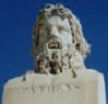

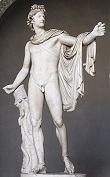
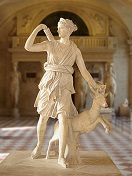
-330 On Jan. 20 the Battle of the Persian Gate sees Alexander III the Great and his 60K-man army take mountain pass known as the Persian Gates (Darvazeh-ye Fars) (modern Tang-e Meyran), after which he takes Susa, holding a festival which incl. athletic events, after which he reorganizes his army for guerrilla warfare, dividing it into units of 75-100 men; in Jan. he reaches the Persian capital of Persepolis, and finds several mutilated Greek captives, pissing him off and adding fuel to the fire of the atrocities committed against Athens 150 years before (-480) by Xerxes, after which the city is looted and burned in revenge; after promising not to do it since he wants to rule the country but getting drunk, Alexander and his army burn the great Palace of Xerxes; the captives allegedly debate whether they should return and shock their families, or stay in Persia with friends with benefits - I'm thinking Arby's? In the spring Alexander III the Great pursues Darius III N through Media toward his summer palace on the Caspian Sea, meeting up with Darius' troops at Damghan, then learning that Darius has been arrested by his own satraps in Parthia (modern Afghanistan) in hopes of stopping Alexander from invading Persia further, but Alexander refuses the offer and attacks; in early July Darius III is murdered near Rhagae in the Persian desert E of modern-day Tehran by his own kinsman Bessus (d. -329), satrap of Bactria, who retreats to Bactria and proclaims himself Darius' successor Artaxerxes V; Alexander views Darius' body, covering it with his cloak (he wanted to keep him alive as a puppet king), then pursues Bessus, subduing the Caspian region and taking Aria in Sept., then Drangiana in Nov., then marching S into Persia. Demosthenes is accused by Aeschines of illegally accepting a civic crown, then tried and acquitted. Compulsory military training for all Athenian youth (epheboi) is established. Alexander I of Epirus (b. -370) is KIA at the Battle of Pandosia by a Lucanian emigrant, and the Italiote League breaks up, after which the Epirotes eventually leave Italy. Olympias returns to Molossis and serves as regent for her cousin Aeacidas. Philotos, son of Parmenio (b. -400) is executed for complicity in a plot, causing Alexander to send messengers to murder Parmenio in Media to prevent a possible revolt. Seuthes III (d. -300) becomes king of Ordysai (between the Haimos and Rhodope Mts.). The Kingdom of Qataban in S Arabia is founded (ends 160). The Lihyan Kingdom in N Arabia is founded (until -100). Greek geographer Pytheas of Massilia (-380 to -300), seeking to circumvent the Phoenician monopoly sets sail from Massalia (Marseille), passing through Gibraltar then sailing N as far the British Isles, the coasts of France and Denmark, the Shetland (Zetland) Islands, and possibly to Iceland and Norway, which he calls Thule (because if you try to pee you'll freeze your tool?), and the mouth of the Don River in the Black Sea; the first literate explorer of these areas, he refers to the British Isles as the Isles of the Pretani (Britanni) ("people of the designs"), made up of Irish Cruithin (Gael. "painted or tattooed people"), Scottish Picts (Lat. "painted or tattooed people") and Welsh Britons; he also develops the use of North Star sightings to determine latitude, and discovers that tides are related to the phases of the Moon. Fergus (Gael. "highest choice") I Mor (the Great) (d. -305), son of Erc becomes the first king of Dalriada in W Scotland, transporting the 335-lb. Stone of Scone (pr. "SKOON") from Ireland to Argyll before being crowned on it; actually a line of kings leading to real king Kenneth MacAlpine (d. 858) is invented in the 14th cent. C.E., and not exposed until 1729 by Father Thomas Innes, but they keep cropping up in chronologies until the mid-1960s, so why not keep them for funners? Athenian courtesan Thais accompanies Alexander III the Great on his Asiatic campaign? As Alexander's troops, which come from all over Greece and speak various dialects (not only the "pure" Attic one) begin to develop their own Koine (common) dialect, the Hellenistic Koine Period of the Greek Language begins (ends 330 C.E.), replacing Aramaic as the universal language of the civilized West in the wake of Alexander's conquests, and continuing even after the Roman takeover. About this time Greek poet ("the Daedalus of Tasty Dishes") Archestratus (Archestratos), born in Gela or Syracuse in Sicily flourishes, becoming the first cookbook writer with his humorous didactic poem Hedypatheia (The Life of Luxury), which waxes lyrical about a "boiled torpedo done in oil and wine and fragrant herbs, plus some thin grated cheese"; he also writes the amorous poem The Art of Cookery. The Iron III Period of Archaeology (begun -600) ends, and the Hellenistic Period of Archaeology begins (ends -63). Art: The Red Figure Period of Greek art ends, and the Hellenistic Period of Greek Art (ends -31) begins, spreading with Alexander III the Great's conquests, only to be stopped by the Romans with the defeat of Cleopatra VII at Actium; the statue of Hermes of Praxiteles (Olympia) and the Infant Dionysus is finished, and so is he; rediscovered in 1875 C.E. - this stupid knife dispenser is stuck? About this time the 7.3' nude dangly Apollo Belvedere statue is sculpted of white marble by Greek sculptor Leochares, showing Apollo after having shot an arrow; a Roman copy is made about 130 C.E., which is discovered in 1489 in Anzio, Italy, and ends up in the hands of Pope Julius II (Giuliano della Rovere); in 1755 German art historian Johann Joachim Wincklemann calls it the best example of the Greek aesthetic ideal, after which it becomes an icon of the Enlightenment; in 1796 Napoleon steals it from the Vatican, which gets it back in 1815 after his fall; Leochares also sculpts Diana of Versailles (Diana Chasseresse) (-325), which is is given in 1556 by Pope Paul VI to Henry II of France, who places it in his Jardin de la Reine in Fontainebleau, after which in 1602 Henri IV moves it to the Louvre, after which in 1710 Louis XIV moves it to Versailles; a miniature replica stands on the fireplace mantle in the first class lounge aboard the Titanic when it sinks; Leochares also sculpts ivory-gold statues of Philip II of Macedon, Alexander III the Great, Olympias, Amyntas III, and Eurydice I, exhibited in the Philippeion in the Altis of Olympia, built by Philip II to celebrate his V at the Battle of Chaeronea in -338. Architecture: The 3rd Temple of Apollo in Delphi, Greece is completed to replace the 2nd one, which was destroyed in -375 by an earthquake; "Know thyself" (Gr. "gnothi seauton") is inscribed in the forecourt (pronaos). Nonfiction: Aristotle (-384 to -322), Politics; a critique of Plato's advocacy of rule by philosopher-kings, analyzing monarchy, aristocracy, constitutional govt., tyranny, oligarchy, and democracy; disses common ownership of property because of the "wickedness of human nature", with the soundbyte: "It is clearly better that property should be private, but the use of it common, and the special business of the legislator is to create in men this benevolent disposition"; dumps Plato's credit theory of money for Metallism, the theory that money derives its value from the purchasing power of the commodity upon which it is based, is only a medium of exchange, an "instrument", and on its own "it is worthless... not useful as a means to any of the necessities of life", but warns about obsession with money accumulation, praising "wealth-getting" for one's household as "necessary and honorable", while dissing the massing of money via retail trade as "justly censured, for it is dishonorable", also dissing usury and monopolies. Roman consuls: Lucius Papirius Crassus and Lucius Plautius Venno. Births: Greek philosopher (in Macedonia) Euhemerus (Gk. "happy, prosperous") (Euemeros) (Evemerus) (d. -260) in Messina, Sicily (Chios?) (Tegea?); teaches at the court of Macedonian king Cassander; originator of Euphemerism, which holds that myths can be attributed to historical persons and events. Deaths: Macedonian gen. Parmenio (b. -400) in Media (murdered). Greek king of Epirus (-342 to -330) Alexander I (b. -330) in Pandosia, Italy (KIA). Greek sculptor Praxiteles (b. -370).
-329 Early in the year Bessus tries to prevent Alexander the Great from crossing the Oxus (Amu Darya) River into Bactria, but fails, and his own men hand him over to Alexander, who mutilates him by cutting off his ears and nose, then has him brought back to the place where he killed his master and tried by a Persian court and crucified; Alexander then invades soggy Persian-held Sogdiana in C Asia SE of the super-salty (10%) Aral Sea between its filler-uppers the Oxus (Amu Darya) (S) and Jaxartes (Syr Darya) (N) Rivers, and conquers the Persians under Spitamenes (Spitamaneh) (-370 to -328) with difficulty, conquering the capital Samarkand (Maracanda) in modern-day Uzbekistan (modern-day pop. 500K) before invading Afghanistan and capturing Gandara (Kabul) 125 mi. E of the Khyber Pass (modern-day pop. 4.6M), causing the Afghanis to resist with guerrilla fighting, which Alexander meets with scorch-and-burn tactics; he then detours NE through the Hindu Kush ("Hindu killer"?) in the spring, and captures Arachosia in Mar.; meanwhile the pagan Kafirs in Kafiristan are formed by Greeks staying in the country, becoming an unconquerable region that is later used as the setting of Rudyard Kipling's 1888 story The Man Who Would Be King. Roman consuls: Lucius Aemilius Mamercinus Privernas and Gaius Plautius Decianus.
-328 The 113th Olympiad. Alexander III the Great, "Conquerer of the World", "the Macedonian Madman" becomes great king of Persia, showing favor to them by adopting many Persian customs, dressing up as a Persian, making people bow down to the ground and kiss his feet (proskynesis), and generally letting his passions take him over; he drinks wine to excess, and believes in diviners, who throng his court; he trains 30K Persians to fight in the Macedonian fashion; the sophist Anaxarchus (-380 to -320) (who accompanies him into Asia along with Pyrrho) tells him that "what is done by a great king should be held just", and next year allegedly debates with Callisthenes at Bactria, telling him that Alexander should be worshiped as a god even during his lifetime; he allegedly founds the town of Kandahar (Candahar) (originally Alexandria) in Afghanistan 250 mi. SW of Kabul. The Romans siege Greek-held Neapolis (Gr. "New City") (Naples) on the Bay of Naples 120 mi. SE of Rome (until -327). Roman consuls: Gaius Plautius Decianus and Publius Cornelius Scapula.

-327 Alexander III the Great's mistress Barsine bears a son named Heracles (d. -309), his first son; Alexander defeats Bactrian king Oxyartes at Sogdian Rock fortress in Balkh, Bactria, and takes his 16-y.-o. daughter Roxane (Roxana) (Pers. "the dawn") (-340 to -310) captive, then marries her to cement relations with Bactria, not having sex with her until after the ceremony, which makes him even more popular; Barsine returns to Pergamon - Roxane, you don't have to put out the red light? Alexander III the Great's gen. Craterus (-370 to -321), known for going lion hunting with him in the nude is given the first independent command in the Macedonian army to take on the Tapurians of Hyrcania; meanwhile late in the year Alexander invades India at the invitation of Taxiles (King Ambhi of Taxila), who wants him to fight King Porus (Parvataka), and with Roxane at his side he crosses the Hindu Kush into N India, then over the Indus River, capturing Persian-held Bombay; too bad, upon seeing the 4K well trained and equipped war elephants of the Nanda Empire, his forces mutiny at the Beas River; his dog Peritas (Gr. "January"), of the Skilos tou Alexandrou (Molosser) Mastiff breed (which has been with him since age 11) dies on a pass in India, causing Alexander to later name a city after him - it's fun to get out and meet people? The Greek colony of Neapolis comes under Roman control, but retains its Greek culture, going on to become a favorite resort for the wealthy - the clothes make the matron? Roman consuls: Marcus Claudius Marcellus (dictator) and Lucius Cornelius Lentulus and Quintus Publilius Philo.
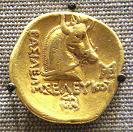
-326 Alexander III the Great wins a number of military Vs, culminating in May in the defeat of Hindu king Porus (Raja Puru) (Rai Por) (Raja Purava) (Raja Parvatka), king of Paurava at the Battle of the Hydaspes (Jhelum) River in the Punjab near Bhera in modern-day Pakistan, after which in June Alexander loses his legendary steed Bucephalus (Bucephalus) (b. -355) and founds the city of Bucephala (Alexandria Bucephalus) to honor him near modern-day Jalapur Sharif, after which he advances to the Hyphasis (Beas) River, but his Macedonian army refuses to go any farther east - you see that big black dude on steroids? In Nov. Alexander III the Great marches via the Hydaspes and Indus Rivers to the Acesines River near the Indian Ocean and fights the Mallian Campaign (ends Feb.) against the Malli and Oxydraci of the E Punjab, on the Indus River, leaping single-handedly from their city wall into their midst, where he is wounded by an arrow but rescued by his troops. Athenian orator Hypereides (Hyperides) (-390 to -322) is elected ruler of Athens, going on to promote war against Macedonian rule after the death of Alexander III the Great. The Second Samnite War (ends -304) begins after Rome violates a treaty and founds a Latin colony across the Liris River at Fregellae in -328, and the Samnites attack it; the Apulians ally with the Romans. Bas (b. -397) dies, and his son Zipoites (Zipoetes) (Ziboetes) I (-354 to -278) becomes the 2nd ruler of Bithynia in NW Asia Minor (until -278), and in -397 takes the title of king. Roman consul Gaius Poetelius Libo Visolus gets the Lex Poetelia Papiria passed, abolishing the Nexum (debt-bondage). Promagistracies are introduced in Rome to extend the term of office of a consul to complete a military campaign. Roman consuls: Gaius Poetelius Libo Visolus and Lucius Papirius Cursor. Deaths: Bithynian ruler (-376 to -326) Bas (b. 397).
-325 The list just keeps growing? In July after his troops refuse to go further E, Alexander the Great halts on the banks of the Indus River and returns to Macedon through the Gedrosian Desert, where lack of supplies decimates his troops; Nearchus (Nearchos) of Crete returns with his fleet via the coast of the Indian Ocean and the Persian Gulf to the Euphrates River, reporting "a reed in India that brings forth honey without the help of bees", observing people growing sugar cane and making granulated sugar ("sarkara") (Lat. "saccarum") (Gk. "zakkhari"), causing Alexander's soldiers to carry some of the "honey-bearing reeds" home with them; native rebel Chandragupta Maurya occupies the Punjab after Alexander withdraws, planning a rebellion. The Oscan city of Cumae in S Italy is conquered by the Romans, who turn it into a seaside resort for Roman politicos. Lame Macedonian noble Harpalus (son of Machatas), a boyhood chum of Alexander III the Great who was given a post in Asia Minor, where he was contacted frequently by Alexander III for reading material (Aeschyulus, Sophocles, Euripides, Philistus, Philoxenus, Telestes, etc.) is caught embezzling funds while Alexander is in India, and flees to Athens, where he bribes Athenian officials to secure sanctuary. Roman consuls: Lucius Papirius Cursor (dictator) and Lucius Furius Camillus and Decimus Junius Brutus Scaeva. Art: About this time Leochares sculpts the marble Diana of Versailles. Births: Greek geometer ("Father of Geometry") Euclid of Alexandria (d. -265) in Stagira, Macedonia.

-324 The 114th Olympiad. In Mar. after Alexander III the Great's army and navy meets in Caramania for a rest stop, it heads for Susa, the capital of Elam; he then orders 80 of his officers to Persian-up and marry Persian or Median ladies, and marries soldiers to their hos, and pays the soldiers' debts; he marries his 2nd wife Statira (Stateira) (Gr. "creation of the stars") (II) (-340 to -320), daughter of Darius III Codomannus and sister of Drypetis (Drypteis) (d. -323), then recalls Greek exiles and proclaims himself the son of the god Zeus Ammon instead of his human father Philip II, sending 10K unfit Macedonians home and replacing them with Persians, then going on to replace native satraps by Macedonians, and make his boyfriend gen. Hephaestion (Hephaistion) (-356 to -324) his #2 in command (hipparch) (grand vizier); too bad, he dies en route from Susa to Ecbatana and is not replaced even though extravagantly mourned; it seems like the West is going to be ruled by the gay Greeks forever? Demosthenes is exiled from Athens for taking bribes from Harpalus. Roman consuls: Lucius Papirius Cursor (dictator). Deaths: Athenian statesman-orator Lycurgus (b. -396). Macedonian gen. Hephaistion (b. -356) en route from Susa to Ecbatana (fever) (poison?).





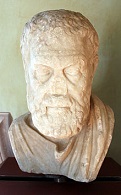

-323 Roman consuls: Gaius Sulpicius Longus and Quintus Aulius Cerretanus. Early in the year, faced with the choice of going back to conquer India or conquering Arabia next, Alexander III the Great (b. -356) picks proud unconquered Arabia, gathering a large army and navy at Babylon while making plans the Dean Martin Way (sousing in booze); one day he gets mad at friend and countryman Clitus for criticizing him for allowing a song to be sung which ridicules Macedonian officers, loses his temper and kills him with a spear, then sobers up, repents, goes to his tent for three days to mourn, and allegedly gets over it, but shortly afterward (May 31) falls ill after a prolonged eating-drinking bout, keeps drinking despite it, loses his voice, lets his soldiers see him one last time, "already speechless as the army filed past... he greeted one and all, raising his head, though with difficulty, and signing to them with his eyes" (nice ass, nice package, etc.?); on June 10 he dies in Babylon of fever (malaria?) at age 32 years 8 mo., before he can name a successor or consolidate his vast (2.18M sq. mi.) empire, incl. the S Balkan peninsula, Asia Minor, Egypt, and the entire Near East as far E as the Indus River (and make more of the East white, blonde and Western like himself?) (and conquer Arabia, possibly preventing the later rise of Islam?); his body is preserved in a huge crock of honey; before croaking and being crocked, Alexander gives his ring to his gen. Perdiccas (-360 to -320), uttering the soundbyte that he gives his empire "kratistoi" (to the strongest), although he might have said "to Craterus"; either way, nobody wants Alexander's children by "barbarians" Barsine or 5-mo.-pregnant Roxana to be his heir, and his gens. scramble for power, resulting in the Wars of the Diadochi (ends -275) and the division of the empire into four kingdoms under four dynasties, Macedonia (the Antigonids), Egypt (the Ptolemies), Pergamon (the Attalids), and Syria-Mesopotamia (incl. Persia) (the Seleucids). The original Omen starring evil-eyed Damien? In Sept. while the world holds its breath, Alexander's wife Roxane bears a son named Alexander IV (-323 to -309), who with his 25-y.-o. half-brother Philip III Arrhidaeus (-359 to -317) (illegitimate son of Philip II of Macedon and Philinna of Larissa) are made co-rulers under the regency of Alexander's vizier gen. Perdiccas; Alexander's gen. Meleager (d. -323) (son of Neoptolemus) becomes the first of Alexander's officers to propose that they not wait until pregant Roxana bear a son, and at first backs mentally-deficient Philip III, while Perdiccas's ambition pisses-off Meleager, who storms out of the meeting and joins a mutiny of the soldiers, and gets into a death struggle with Perdiccas, after which Eumenes of Cardia (-362 to -316) brokers a too-good-too-be-true deal, getting all to agree to give the succession to Philip III and Roxana's unborn son Alexander IV, with Mealeager and Perdiccas as regents, while Perdicca switches to Philip III, who becomes his puppet to buy time to outmaneuver and kill Meleager, after which Antipater and Craterus share Macedonia and Greece; Laomedon of Mytilene gets Syria and Phoenicia; Ptolemy I Soter (-367 to -283) gets Egypt; Philotas (d. -330) gets Cilicia; Peithon (Pithon) (-355 to -314) gets Media; Antigonus I Monophtalmus (the One-Eyed) (-382 to -301) gets Pamphylia and Lycia; Leonnatus (-356 to -322) gets Phrygia; Neoptolemus (d. -321) gets Armenia; Eumenes of Cardia gets Cappadocia and Paphlagonia, although he has to win Cappadocia by force from Ariarathes I first (ends -322); Lysimachus (-360 to -281) gets Thrace; Taxiles and Porus remain in charge of their kingdoms in India; Alexander's father-in-law Oxyartes (father of Roxana) gets Gandhara; Sibyrtius gets Arachosia and Gedrosia; Stasanor of Cyprus gets Aria and Drangiana; Philip III (-359 to -317) gets Bactria and Sogdiana; Phrataphernes gets Parthia and Hyrcania; Peucestas gets Persis; Tlepolemus gets Carmania (modern-day Kerman Province, Iran) on the Persian Gulf coast W of Hormuz; Atropates (-370 to -320) gets N Media; Archon of Pella (d. -321) gets Babylonia until he is KIA in -321 in a fight with Docimus; Arcesilas gets N Mesopotamia; too bad, Meleager and about 300 of his partisans are killed by forces loyal to Perdiccas; meanwhile Alexander's hand-that-rocks-the-cradle first wife Roxane plots to have second wife Barsine murdered - and the game is on, forever proving that blonde whitey is too stupid to unite and rule the world, because there is no real white race, only lighted and unlighted windows? After receiving the good news about Alexander, and ignoring the advice of Phocion, the lame Lamian War (ends -321), a revolt against Macedonian regent Antipater begins when Athenian gen. Leosthenes (d. -323) and orator Hypereides (Hyperides) (-390 to -322) give inflammatory speeches, and the revolt spreads through C and N Greece; Phocion is put in charge of military actions against Boeotia, and calls all Athenians ages 60 and under to join the army, pointing out that he's 80 and will be their leader; Leosthenes defeats Antipater in battle and forces him to Lamia, circling and sieging him for several mo., with Phocion saying that he wished he had been the gen. who achieved this V, but would still have counseled as before; Leosthenes is killed, and new strategos Antiphilus (not the painter) is appointed to counterbalance Phocion; meanwhile Aristotle's pupil Theophrastus (-371 to -287) becomes dir. #2 of the Lyceum in Athens after Aristotle (Alexander's teacher) is forced to leave the city by anti-Macedonian forces (accused of impiety), fleeing to Chalcis in Euboea; meanwhile the Athenians recall Demosthenes from exile and pay his fine. A civil war begins in Sicily (ends -316) between the oligarchs and democratic leader Agathocles. After Alexander the Great's death commercial traffic between the Mediterranean and the Far East finally becomes regular and extensive. According to the Mormons, the city-region of Zarahemla in South Am. or Central Am., capital of the Nephites is discovered about this time by Mosiah, becoming the scene of protagonists of the Book of Mormon; too bad, God destroys every trace of it by modern times, so don't bother to send archeologists. Births: Macedonian prince Alexander IV Aegus (d. -309); son of Alexander III the Great (-356 to -323) and Roxana. Deaths: Greek tub-lover Diogenes (b. -412) on June 10; dies on the same day as Alexander the Great after having an interview with him, and when asked by Alexander how he can best serve him, telling him, "Stand out of my sunshine", causing Alexander to remark, "If I were not Alexander, I should wish to be Diogenes"?: "Humans have complicated every simple gift of the gods"; "I fawn on those who give me anything, I yelp at those who refuse, and I set my teeth in rascals" (when asked why he lives like a dog); "If only it were as easy to banish hunger by rubbing my belly" (when asked why he masturbates in public); "I am a citizen of the world (cosmopolites)" (first use of the word cosmopolitan); "It is not that I am mad, it is only that my head is different than yours." The closest man has ever come to eternity, and he dies at age 33 after gaining the whole world and losing his soul? The ultimate source of the Jesus story? Greek conqueror Alexander the Great (b. -356) on June 10 in Babylon (fever); dies after bringing the banana, the ring-necked parakeet, sugar, cotton (all from India), and crucifixion (from Persia) to Europe; poisoned with slow-acting white hellebore?; really dies of Gullain-Barre Syndrome?; his body fails to show any signs of decomposition for six days after his death, causing the Greeks to believe he is a god; spent his life seeking the formula for eternal life, causing him to be called al-Iksander, the 2-horned god, pictured on coins wearing the spiral ram's horns of divinity on his head; or did he never really die, but broke his crown and ran away, becoming the first Romany (gypsy), wanting only eternal freedom? - the good die young? Macedonian Gen. Meleager.



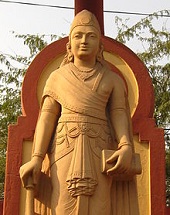
-322 The Athenians under gen. Phocion defeat the Macedonians under Gen. Mikion at the Battle of Rhamnus in Attica; simultaneously the Athenians under Antiphilus defeat the Macedonians in Thessaly, but a large army from Asia under gen. Craterus defeats their combined Athenian army at the Battle of Cranon (Crannon), and Antipater's army closes in on Athens, causing both Athenian gens. to come crawling to him to talk peace, to which he responds that now that his soldiers are here, why stop?; Phocion then kisses up to him bigtime and gets him to parley; back in Athens, the supporters of Macedonia condemn Hypereides and other orators to death, and Hypereides flees to Aegina before being captured at the Temple of Poseidon and executed; meanwhile Demosthenes flees to avoid arrest by Antipater's lt. (an actor) Archias of Thurii, and commits suicide on Calauria Island. Alexander's gens. Ptolemy, Antigonus I Cyclops, Antipater (-397 to -319), and Craterus (-370 to -321) form a coalition against Perdiccas. Rhodes expels the Macedonians, and goes on to two cents. of prosperity, culture and power. 82-y.-o. Ariarathes I of Cappadocia (b. -403) is defeated by Perdiccas, and crucified with many of his relations, and Eumenes takes full possesion of Cappadocia (until -301). A new tax on metics (foreign residents) is instituted, and when Platonic Academy head Xenocrates is unable to pay, Athenian orator Demetrius Phalereus pays it for him. The Greek Money Honey out of the way, Chandragupta Maurya (Sandrocottus) (-340 to -297) overthrows the Nanda throne in Magadha in modern-day Bihar, home of Buddhism and Jainism, and next year founds the Maurya Empire in India (ends -185), going on to extend his control over most of the subcontinental mainland in the next decade; Chanakya (-350 to -283), who engineers his rise to power becomes his PM, writing the Arthashastra, a treatise on statecraft, economic policy, and military policy; Greek control of India slips slides away, but leaves a lasting imprint in Indian art (esp. sculpture) and science. Roman consuls: Aulus Cornelius Cossus Arvina (dictator) and Quintus Fabius Maximus Rullianus and Lucius Fulvius Curvus. Plays: 20-y.-o. Menander (-342 to -291) debuts his first play, The Self-Tormentor - about menanderbation? Deaths: Greek Athenian orator Hypereides (b. -390) in Aegina (executed). Greek Golden Mean philosopher Aristotle (b. -384); dies after parting ways with Plato and founding the Lyceum, preferring to collect data rather than sit around thinking, and deciding (after much personal experience?) that all inheritance comes from the father, the mother merely providing the material, and that female babies are caused by "interference" from the mother; leaves 260 treatises, incl. Constitution of Athens (written in -350) (discovered in 1890 C.E.), Physics, Metaphysics, Ethics, Logic (Prior Analytics), Zoology, De Anima (On the Soul) (the nous poietikos or active intellect vs. the nous pathetikos or passive intellect), which first mentions the Tabula Rasa view of the mind as starting out a blank slate, and Poetics, the first work on art criticism, valuing art based on how it imitates the universal in human nature, and claiming criticism as a science: "Man is by nature a political animal"; "Hope is a waking dream"; "Tyrants preserve themselves by sowing fear and mistrust among the citizens by means of spies, by distracting them with foreign wars, by eliminating men of spirit who might lead a revolution, by humbling the people, and making them incapable of decisive action"; "Music directly represents the passions of the soul. If one listens to the wrong kind of music, he will become the wrong kind of person"; "I have gained this from philosophy: That I do without being commanded what others do only from fear of the law." Greek statesman-orator Demosthenes (b. -384) on Calauria (Kalaureia) Island (near Poros) (suicide by poison): "He who confers a favor should at once forget it if he is not to show a sordid, ungenerous spirit." Greek philosopher Anaxarchus (b. -380).
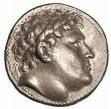
-321 Perdiccas' gen. Eumenes of Cardia (-362 to -316) defeats and kills Craterus (b. -370) and his rebel Greek auxiliaries in Asia Minor near the Hellespont; Craterus dies after his horse falls on him. A Roman army is trapped by the Samnites in Samnium at the Battle of Caudine Forks, and Rome is forced to negotiate an unfavorable peace (until -316). The Lamian War (begun -323) is ended with a humiliating treaty for Athens, with 12K Athenians disenfranchised and heavy reparations demanded, causing a mass migration to Thrace; Phocion becomes the de facto ruler of what's left of Athens, sucking up to Antipater and becoming unpopular with the people, who blame him for handing Athens to him and getting Demosthenes killed. Roman consuls: Quintus Fabrius Ambustus (dictator) and Titus Vetturius Calvinus and Spurius Postumius Albinus. Deaths: Macedonian gen. Craterus (b. -370).


-320 The 115th Olympiad. Perdiccas (b. -360) is assassinated while campaigning in Egypt against Ptolemy, then Ptolemy meets with Antigonus and Antipater in N Syria, and they agree to make Antipater the regent of Alexander the Great's empire; Antigonus then defeats Eumenes in Cappadocia, and dies next year, passing over his son Cassander (-355 to -297) as his successor for old fart gen. Polyperchon (-394 to -303), pissing-off Cassander, as well as Ptolemy and Antigonus; after securing Cassander's release, Eumenes accepts Polyperchon's offer to ally against Antigonus in Asia. The Tarentines make peace with the Samnites in S Italy. Pytheas the Greek (-380 to -300) of Massalia (Marseille), having returned from a 7K mi. voyage, during which he circumnavigated Britain and watched people harvesting grain and tending cattle, visited tin mines in Cornwall, searched for amber on the coast of Denmark, going as far as Thule (Iceland or Norway), then returning via Ireland, pub. On the Ocean; he describes the Goths as a tribe dwelling on the Baltic; he says of Britain "The island is thickly populated and has an extremely chilly climate"; the people are "unusually hospitable, and... gentle in their manner... Their diet is inexpensive and quite different from the luxury that is born of wealth... It has many kings and potentates, who live for the most part in a state of mutual peace"; the British people "are simple in their habits, and far removed from the cunning and knavishness of modern man... they do not drink wine, but a fermented liquor made from barley, which they call curmi"; he also describes waters so cold that chunks of ice float in them, and that farther north (a day's sail from a land called Thule) the water is completely frozen, and the sun never sets during the summer solstice; too bad, his books are regarded as fiction by Polybius, Strabo and others, and are eventually lost, saving the British Isles and who knows what else from Grecification? Shahru II becomes king of Lihyan in N Arabia (until -305). Zhou Xian Wang dies, and Zhou Shen Ling Wang (d. -314) becomes Dong Zhou king #23 of China. Roman consuls: Lucius Papirius Cursor and Quintus Publilius Philo. Roman dictators: Gaius Magnius and Lucius Cornelius Lentulus and Titus Manlius Imperiosus Torquatus. Births: Greek Athenian skeptic philosopher Timon of Phlius (d. -230) in Phlius; student of Pyrrho. Deaths: Macedonian gen. Perdiccas (b. -360) in Egypt (assassinated).
-319 Cassander orders his officer Nicanor to replace Menyllus as ruler of Munychia, causing nearby Athens to split into two camps, with the aristocrats on Cassander's side and the non-aristocrats on Polyperchon's side; strategos Phocion plays off both sides, getting Nicanor freed after he is arrested by Athenian soldiers at Piraeus during a conference with him, but the Athenian assembly then orders him to attack Nicanor, and he balks, allowing Nicanor to turn the Athenian soldiers against him and seize Piraeus. Roman consuls: Lucius Papirius Cursor and Quintus Aulius Cerretanus. Births: Greek Pyrrhic Victory statesman-gen. and king of Molossia (-297 to -272), Epirus (-306 to -301, -297 to -272), and Macedonia (-288 to -284, -274 to -272) Pyrrhus (Pyrrhos) of Epirus (d. -272) in Epirus; son of king Aeacides of Epirus (d. -313) and Phthia; 2nd cousin of Alexander III the Great (-356 to -323); nephew of Alexander I the Molossian. Deaths: Greek Macedonian gen. Antipater; executor of Aristotle's will; leaves "The Illyrian Deeds of Perdikkas".
-318 After Polyperchon's son Alexander arrives in Athens with a Macedonian army, he gets Phocion deposed as strategos, then condemned as a traitor along with 10 of his party, and ordered to drink hemlock, paying the executioner 12 drachmas for it, with the last words: "For a man, it is hard to die in Athens without paying for it"; Polyperchon and Dimades are elected rulers of Athens; Nicaner is executed by the Macedonian army. Antigonus marches against Eumenes, who withdraws E of the Tigris River, joining the Persian satraps. Roman consuls: Marcus Folius Flaccinator and Lucius Plautius Venno. Deaths: Greek Athenian statesman-gen. Phocion (b. -402) on May 19 in Athens (executed by hemlock).

-317 In the summer after pursuing Eumenes into C Persia, Antigonus I fights the indecisive Battle of Paraetacene (Paraiteakene) (near modern-day Isfahan NE of Susa) (3.7K KIA and 4K injured for Antigonos vs. 540 KIA and 1K injured for Eumenes). Olympias' army invades Macedonia in support of Polyperchon, and captures and executes Philip III Arrhidaeus, leaving Olympias' grandson Alexander IV as sole ruler of Macedonia; Cassander seizes Piraeus and leaves Peripatetic orator Demetrius of Phaleron (Demetrios Falireas) (-350 to -280) (student of Theophrastus) in command of Athens (until -307), then heads for Macedonia. Troops sent by Syracuse led by Agathocles' brother Antander (Andro) to relieve Crotona are signed by the Bruttii tribe. Roman consuls: Gaius Junius Bubulcus Brutus and Quintus Aemilius Barbula. Deaths: Macedonian king Philip III Arrhidaeus (b. -358) (executed).


-316 The 116th Olympiad. Cassander defeats Olympias at the Little Bitty Battle of Pydna (the big one is in -168), then executes her and imprisons Roxana and her son Alexander IV. Antigonus I surprises Eumenes while he winters at the Battle of Gabene, which Eumenes seems to be winning until his ally Peucestas turns traitor and causes him to lose his baggage camp, which incl. the booty of 30 years of Vs along with the women and children, to Antingonus, who demands that Eumenus be handed over by the Silver Shields, after which he starves him for three days and executes him. Antigonus I drives Seleucus from Babylon to refuge with Ptolemy in Egypt, gaining control Mesopotamia and Asia Minor, and turning his attention to Syria. Agathocles (-361 to -289) ends the civil war (begun -323), and becomes tyrant of Syracuse (until -289), expelling the oligarchs and dividing their property among the poor. The Romans resume hostilities against the Little Black Sambos, er, Samnites. The Qin (Ch'in) eliminate the Shu kingdom. Thessalonica is founded by Cassander and named after his wife (a stepsister of Alexander the Great), and becomes the main port of the Macedonian capital of Pella. The suttee (Sans. "true wife") practice in India of a wife burning herself on the funeral pile of her husband is first mentioned; it starts among the royalty and spreads to the gen. pop. Menander writes the (lost) play Anger. Roman consuls: Lucius Aemilius Mamercinus Privernas (dictator) and Spurius Nautius Rutilus and Marcus Popilius Laenas. Births: Egyptian queen Arsinoe II (d. -270); daughter of Ptolemy I and Berenice. Deaths: Greek Alexander III the Great's mother Olympias (b. -375) in Pydna; stoned by a mob with the approval of Cassander, and denied burial rights. Greek gen. Eumenes of Cardia (b. -362) (executed by Antigonus).
-315 Antigonus I sieges Tyre. Zipoites I of Bithynia wars against Chalcedon and Astakos. The Samnites kick Roman butt under dictator Quintus Fabius Maximus Rullianus at the Battle of Lautulae near Terracina - which only makes the Romans madder? A man who dies this year in S Africa is the closest link to humanity's common female ancestor, mitochondrial Eve. Roman consuls: Quintus Fabius Maximus Rullianus (dictator) and Lucius Papirius Cursor and Quintus Publilius Philo. Deaths: Greek historian Theopompus (b. -380); leaves Hellenics (12 vols.) (-411 to -394), History of Philip, Letter to Alexander; "A man who wrote slander, not history." (Robin Lane Fox)
-314 Lysimachus joins the other Diadochi (Cassander, Ptolemy I, Seleucus I) in a league against Antigonus I, who is busy sieging Tyre. Qi Xuan Gong invades and almost conquers the Yan Kingdom in N China until the Qi troops commit so much misconduct that a revolt drives tham out; Zhou Shen Ling Wang dies, and Zhou Nan Wang (Ji Yan) (d. -255) becomes Dong Zhou king #24 of China. Roman consuls: Gaius Maenius (dictator) and Marcus Poetelius Libo and Gaius Sulpicius Longus. Deaths: Greek philosopher Xenocrates (b. -396) in Athens. Greek orator Aeschines (b. -389) in Samos. Greek Macedonian gen. Peithon (b. -355) (executed by Antigonus after tricking him to come to his court).
-313 Antigonus I captures Tyre, then finishes taking Syria from Ptolemy, turning his attention to the Aegean, Peloponnese, and Asia Minor. Roman consuls: Lucius Papirius Cursor and Gaius Junius Bubulcus Brutus.


-312 The 117th Olympiad. Early in the year after Ptolemy I invades Syria with 18K infantry and 4K cavalry Antigonus I's son Demetrius I of Macedon and his 12.5K infantry, 4.4K cavalry, and 43 war elephants are defeated at the Battle of Gaza, with 500 Syrians KIA, 8K taken POW, and all war elephants KIA; Antoginus I captures the Nabataean city of Petra, which had been by used by the Arabs to store treasure, and carries it all away - leaving just enough for an Indiana Jokes, er, Jones flick? Alexander III the Great's Greek Empire is partitioned, and Seleucus I Nicator (Gr. "conqueror") (-358 to -281) receives Babylonia, founding the Seleucid Dynasty of 26 rulers (ends -63), which goes on to incl. Persia, Sogdiana, the E provinces of Bactria, Syria, and large portions of Asia Minor; the Seleucid Calendar AKA Anno Graecorum (Year of the Greeks) begins on Oct. 1, ending up being adopted by Eastern Jews; the Seleucids use the horned horse, elephant, and anchor as symbols on their coins. Agathocles captures Messina (Messana) with the help of Latin mercenaries (Oscans or Mamertines), who stay afterwards and eventually take over. Blind Roman censor Appius Claudius Caecus (the Blind) (-340 to -273) begins distributing freedmen among the rural tribes (until -304), and begins building the Appian Way (Via Appia) in Italy, extending SE from the Palatine Hill in Rome to Capua; it is later extended to Beneventum, Tarentum, and Brundisium (350 mi. total), and the Greek cities of Campania; he also builds the first Roman aqueduct; the Celts had been building roads for at least two cents. by this time, and introduce helmets with cheek-guards, which the Romans steal from them? Silver coinage is first issued by Rome. Roman consuls: Gaius Sulpicius Longus (dictator) and Marcus Valerius Maximus (Corvinus) and Publius Decius Mus II.
-311 Seleucus I campaigns in the eastern provinces (until -302), and recaptures Babylon from Antigonus I, and proceeds to secure it (ends -304). The exiled oligarchs of Syracuse appeal to Carthage, causing the latter under Gen. Hamilcar to defeat Agathocles at the Himera River and siege Syracuse. Roman consuls: Gaius Junius Bubulcus Brutus and Quintus Aemilius Barbula.
-310 In the late 4th cent. B.C.E., (-150?) the city of Trier (Triers) (Treves) (modern-day pop. 110K) in the lower Moselle River Valley in the W of the modern-state of Rhine-Palatinate near the modern-day Luxembourg border is founded by the Celtic Treveri tribe; it goes on to become one of the four capitals of the Roman Empire in the late 3rd and early 4th cents. C.E. Roxana and her son Alexander IV (b. -323) are put to death. Agathocles of Syracuse lands at Cape Born and attacks Carthage, causing the siege of Syracuse to be lifted; Agathocles stays in Africa until -307, capturing the Berber town of Tunis (named after Phoenician goddess Tanith or Tanut) (modern-day pop. 1M/2.6M). Roman consuls: Quintus Fabius Maximus Rullianus and Gaius Marcius Rutilus (Censorinus). Births: Greek astronomer-mathematician Aristarchus of Samos (d. -230).
-309 Polyperchon has Barsine and her son Heracles murdered. Cleomenes II dies, and his grandson Areus I (d. -265) becomes Agiad king of Sparta. This year there are six rival kings in Macedonia, while Cassander works to consolidate his position there. The Etruscan city of Perugia (Perusia) on the Tiber River (103 mi. SE of modern-day Florence) comes under Roman domination. Roman consuls: Lucius Papirius Cursor (dictator). Births: Egyptian king (-285 to -246) Ptolemy II Philadelphus (d. -246); son of Ptolemy I Soter and Berenice; half-brother of Ptolemy Keraunos and Meleager; husband of Arsinoe I and Arsinoe II.
-308 The 118th Olympiad. Roman consuls: Publius Decius Mus II (2nd time) and Quintus Fabius Maximus Rullianus. Births: Syracuse king (-270 to -215) Hiero II (d. -215); illegitimate son of Syracusan noble Hierocles. Deaths: Greek Macedonian princess Cleopatra of Macedon (b. -355) in Sardis (assassinated by order of Antigonus after accusing her of plotting with Perdicca to kill her half-sister Cynane, causing her to plot with Ptolemy, after which he gives her a beautiful funeral).
-307 Agathocles of Syracuse leaves his army in Carthage under the control of his sons, and it is annihilated during his absence. Antigonus I sends his son Demetrius to Athens, where he expels Demetrius of Phaleron, and sets up Stratocles as ruler of Athens; Demetrius Poliorcetes restores the Athenian constitution, causing the pop. to honor him and Antigonus as divine saviors; Demetrius of Phaleron settles in Alexandria; pissed-off Cassander starts the Four Years' War with Athens (ends -304). Roman consuls: Appius Claudius Caecus and Lucius Volumnius Flamma Violens.
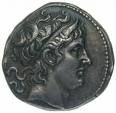


-306 After winning a great V over Ptolemy I at the naval Battle of Salamis in Cyprus, Antigonus I Cyclops (Monophthalmos) (One-Eyed) (-382 to -301) and his son Demetrius I Poliorcetes (Poliorketes) (the Besieger) (-336 to -283) are crowned as kings of Syria, beginning the demise of Alexander III the Great's dream of a single empire controlling the world and ruled by a blonde bi guy? Agathocles concludes a peace with Carthage that lets him declare himself king of Syracuse two years later. Pyrrhus (-319 to -272) becomes king of Epirus (until -272) under the care of guardians. Samos-born Greek philosopher Epicurus (Gr. "ally/comrade") (-341 to -270) founds the Garden School in Athens, which teaches Epicureanism, the teaching that the purpose of philosophy is to attain a happy, tranquil life, characterized by peace and freedom from fear (ataraxia) and the absence of pain (aponia), preferably self-sufficient and surrounded by friends; pleasure and pain are the measures of what is good and evil; death is the end of both body and soul and should therefore not be feared; the gods neither reward nor punish humans; the universe is infinite and eternal; events in the world are ultimately based on the motions and interactions of atoms moving in empty space; too bad, he contracts kidney stones and dies in agony, claiming that "The cheerfulness of my mind, which comes from the recollection of all my philosophical contemplation, counterbalances all these afflictions." Roman consuls: Publius Cornelius Scipio Barbatus (dictator) and Quintus Marcius Tremulus and Publius Cornelius Arvina.


-305 Alexander III the Great's polymath gen. Ptolemy I Soter (Gr. "savior") (-367 to -283), son of Lagus takes power in Egypt, becomng king #1 of the Hellenistic Egyptian Thirty-Second (32nd) (Ptolemaic) (Lagid) Dynasty, which lasts 275 years (until -30); Ptolemy I establishes the great Alexandria Museon (Museum-Library) (Museo) (dedicated to the Muses) in Egypt in honor of Alexander III the Great, whose body he had brought from Babylon and buried there; elite Greek scholars must complete the Logikon, a course in theoretical science before going on to the Cheirourgikon (experimental lab), incl. an observatory, botanical-zoological gardens, dissection rooms, et al.; the library is filled by royal decree, with all travelers visiting the city required to yield up any scrolls in their possession so that copies can be made and given to them; the museum cranks out pioneers incl. Euclid of Alexandria (-365 to -265) (geometry), Herophilus (Herophilos) (-335 to -280) (anatomy), Aristarchus of Samos (-310 to -230) (astronomy), Eratosthenes of Cyrene (-276 to -194) (astronomy), Hero (Heron) of Alexandria (10-70) (steam turbine and windmill-driven organ) et al.; destroyed in 642 C.E. by the Christians, er, Muslims. The Romans decisively defeat the Samnites and force them to come to the negotiating table. Chandragupta defeats Seleucus I Nicator in NW India, and gains portions of Afghanistan. Eudamidas I dies, and his son Archidamus IV (d. -275) becomes Eurypontid king #23 of Sparta. Demetrius I sieges Rhodes (ends -304). Feritharis (d. -290) becomes king of Pictland (Scotland). Roman consuls: Lucius Postumius Megellus and Tiberius Minucius Augurinus. Science: The earliest known Multiplication Tables are inscribed on bamboo strips in China. The Nei Jing, (the Yellow Emperor's Classic of Medicine), the earliest book of Chinese medicine is compiled.
-304 The 119th Olympiad. Ptolemy I assumes the royal title, founding the Egyptian 32nd (Ptolemaic) Dynasty (ends -30), followed immediately by Seleucus I, Lysimachus, and Cassander, which officially dissolves Alexander's empire. After Ptolemy sends a relief force, Demetrius I's siege of Rhodes (begun -333) fails, and he gives up and goes on to relieve Athens from the Four Years' War waged against them by Cassander (begun -307); Rhodes sells its siege equipment for 300 talents and devotes it to building a colossal statue of their patron god Helios. Agathocles of Syracuse comes to terms with Carthage and the expelled oligarchs and takes the title of king; the Tarentines are attacked by the Lucanians and call him for aid. The Samnites sign a peace with the Romans, ending the Second Samnite War (begun -322), giving sole hegemony of Campania to them. The new Roman censors set aside old censor Appius Claudius Caecus' innovations of calling sons of freedmen to the Senate, and limit distribution of freedmen to the four urban tribes. Roman consuls: Publius Sempronius Sophus and Publius Sulpicius Saverno. Births: Greek physician-anatomist Erasistratus (d. -250) in Ioulis, Ceos Island (Cos?) (Chios?) (Samos?); grandson of Aristotle via daughter Pythias?; son of Cretoxena, sister of physician Medius and Cleombrotus?; pupil of Theophrastus, Chrysippus of Cnidos, and Metrodorus.
-303 Cleonymus of Sparta fails against the Lucanians (Lucani) in Magna Graecia in S Italy. Seleucus I Nicator cedes NW India to Chandragupta (Sandrocottus), rebuilds the city of Osroe (Chosroes), and founds the city of Edessa (named after the ancient capital of Macedonia) in SE Turkey (NW Mesopotamia) near the Syrian border (modern-day Urfa, pop. 560K); in the 2nd cent. B.C.E. it is known as Antiochia on the Calirrhoe, becoming the capital of the Kingdom of Osroene from -132 to 242; in 639 it falls to the Muslims; in 1098-1144 it becomes the capital of the Crusader County of Odessa before falling to the Turkic Zengid Dynasty and being absorbed by the Ottoman Empire in 1517. The city of Dura-Europos on the right bank of the Euphrates River near modern-day Salhiye, Syria is built. Roman consuls: Servius Cornelius Lentulus and Lucius Genucius Aventinensis.
-302 Pyrrhus of Epirus is dethroned by an uprising led by Cassander of Macedonia; his cousin Neoptolemus II (d. -297), son of Alexander I of Epirus becomes king of Epirus (until -297). Demetrius I revives the Hellenic League of Philip II, while Lysimachus, Seleucus I, Ptolemy I, and Cassander form an alliance against Antigonus I and Demetrius I - doesn't anybody read the Bible? Lysimachus pacifies the region around Ephesus. The Spartans under Cleonymus (Cleonimos) sail up the Po River, but are repelled by the Patavians (Veneti) from modern-day Padua (Patavium) on the Brenta River (modern-day pop. 214K) (oldest city in N Italy to survive to modern times) (which according to Virgil and Livy was founded in 1183 B.C.E. by Trojan prince Antenor); the Spartans try to take Tarentum, fail, then make an alliance with Tarentum against the Lucanians, causing Tarentum to lose faith with other Greek colonies. Greek gen. Seleucus I gives up plans to invade India and makes an alliance with Maurya ruler Chandragupta, giving him his daughter in marriage, all of which increases Greek cultural influence in N India. The Kingdom of Iberia (Kartli) in Georgia is founded (until 580 C.E.). Roman consuls: Gaius Junius Bubulcus Brutus (dictator) and Marcus Livius Denter and Marcus Aemilius Paullus.
-301 The Battle of Ipsus in Phrygia sees 81-y.-o. Macedonian king Antigonus I Monophtalmus (b. -382) and his son Demetrius I defeated by the combined armies of Cassander of Macedon, Lysimachus of Thrace, and Seleucus I Nicator of Babylonia-Persia after Antigonus I starts out winning with his war elephants, but neglects to wear his plate armor and is KIA d with a javelin, causing his army to disintegrate; Demetrius I escapes and continues to terrorize the Aegean with his fleet; Seleucus I receives the lion's share of Antigonus' territories, incl. a large part of Asia Minor and all of Syria, incl. Phrygia, and renames the ancient (2K B.C.E.) N Syrian city of Khalpe (Khalibon) (on the site of modern-day Aleppo) to Beroea (Veroea) after the Macedonian city, becoming the oldest continuously inhabited city to survive to modern times; Lysimachus receives C Asia Minor, and renames Antigonia to Alexandria Troas (Troas) after you know who the Great; Cassander is sole ruler of Macedonia, and his brother Pleistarchus is given Cilicia; Ptolemy I seizes Coele-Syria (S Syria and Palestine) from Seleucus I, who doesn't press his claim because of the former's aid in returning him to Babylon; the last chance to reunite Alexander the Great's empire is kaput. Macedonian satrap Amyntas is defeated by Ariarathes I's adopted son (eldest son of his beloved brother Holophernes) Ariarathes II (d. -280) with the assistance of Armenian king Ardoates, and becomes ruler of Cappadocia (until -280) under Seleucid suzerainty. Olympiodorus (d. -285) becomes ruler of Athens. Chandragupta (d. -297) abdicates to become a Jainist ascetic, going on to starve himself to death, and his son Bindusara ("the Spotted One") Maurya (d. -273) becomes king of the Maurya Empire in Magadha, India (until -273). Roman consuls: Marcus Valerius Maximus Rullianus (dictator). Inventions: Parchment, made of animal hides (and superior to papyrus because it can be printed on both sides and folded) is invented in Pergamon. Deaths: Greek Macedonian gen. Antigonus I Monophtalmus (b. -382) in Ipsus, Phrygia. Greek historian Aristobulus of Cassandreia (b. -375).